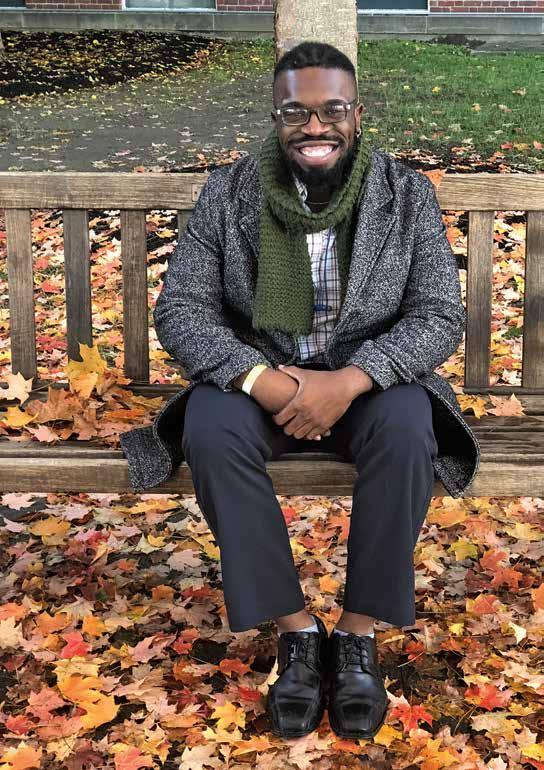WHEATON

Professors and students explore AI






Playing around with artificial intelligence tools while researching our cover story has been fascinating and fun.
Among the things I learned from one tool I tried out is that AI has a sense of humor as well as audacity.
For example, when I began navigating the complexities of Midjourney and had to sign up to use it, the system responded with: “Wait! Are you human? Please confirm that you’re not a bot.”
How dare you?! What audacity for a bot to ask me to click on a box that said “Yes, I am human.”
After I assured it that I am, indeed, human (mostly), I laughed when I got to the long list of things in the popup box citing what signing up would allow the bot to do. The one thing it could not do? “Microbrew some local kombucha.” Funny.
Also hilarious were the renditions of Roary that were produced when I asked AI tools to generate images of our mascot dressed in various ways, including in a nurses uniform.
Another AI tool, Google Bard, was really sweet in right away assuring me that:
“Bard isn’t human. It doesn’t have its own thoughts or feelings, even though it might sound like a human. Remember: Bard can’t replace important people in your life, like family, friends, teachers or doctors. Bard can’t do your work for you. Bard can’t make important life decisions for you.”
Thanks for keeping it real, Bard.
Ted Nesi ’07, who is the politics and business editor and an investigative reporter at WPRITV in Providence, R.I., did a great job writing the story about how Wheaton professors and students are using AI in coursework.
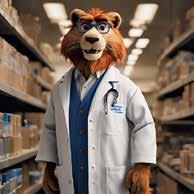
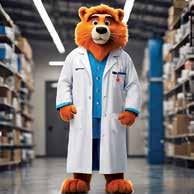
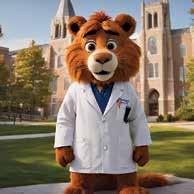
Also hilarious were the renditions of Roary that were produced when I asked AI tools to generate images of our mascot dressed in various ways, including in a nurses uniform.
This issue of the magazine also features stories about an exhibition that showcased Wheaton’s long-lasting relationship with

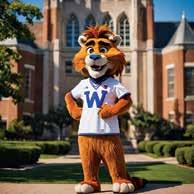

Bhutan and interviews that Associate Professor of Film and New Media Patrick Johnson conducted with students who were filmmakers in residence around the globe.
Enjoy.

Have a comment about the magazine or a story idea? Email magazine@wheatoncollege.edu
Vol. 114, No. 1
Director of communications and magazine editor Sandy Coleman
Designer
David Laferriere
Multimedia producer Keith Nordstrom
Marketing coordinator
Sophie Clarkin ’23
Assistant vice president of marketing and communications
Michael Graca
Vice president for marketing and communications
Suzi Robinson
Wheaton, The Magazine of Wheaton College (ISSN 1068-1558), is published three times a year (winter, spring and fall) by Wheaton College and printed by Lane Press of Burlington, Vt. Periodicals postage paid at Norton, Mass., and additional mailing offices. Postmaster: Send address changes to Wheaton College, Norton, MA 02766.
Wheaton College © 2024
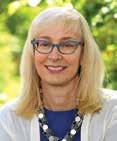
It just feels like home. That’s a phrase I’ve heard many times from students and alums in describing how they feel about the Wheaton community and our campus. I feel it, too. We have a rich variety of spaces to nurture community. Classic brick mingles with modern and postmodern glass and steel facades; courtyards and quadrangles invite gatherings; arboretum-quality plantings, public art and natural woodlands encourage reflection. There is poetry to the place—as anyone standing on the bridge over Peacock Pond at sunset can attest. And the many photos of the Dimple in all seasons capture the changing beauty of the campus heart.
The responsibility of managing this ecosystem, however, is substantial, as I have found. The Wheaton campus comprises 400 acres and 80 buildings, and there are always compelling needs, some anticipated and others unexpected. Preserving and sustaining aging buildings and trees requires careful attention and a steady investment to maintain the campus for future generations of students.
This summer, for example, we completed more than $3.5 million in strategic improvements to Meadows, Beard and Stanton residence halls, theme houses and other spaces. Some improvements, to roofs and building utilities, are critical but largely invisible. Other enhancements— repainting rooms and hallways, replacing floors and furniture—immediately change the way our students see and experience these spaces. In Stanton, we uncovered beautiful wood floors that restore warmth and history. And our planning for more renovation and renewal projects in summer 2024 is well underway.
These investments are essential for the college’s future. The beauty of Wheaton's campus is central to our institutional identity; it draws students to our campus,

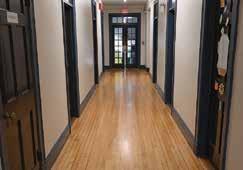
and it reflects generations of investment by alums, parents and friends. The named buildings and spaces across campus testify to that generosity. In fact, the progress being made in refreshing campus spaces would not be possible without the active care and participation of the Wheaton community. For example, Louise “Weezie” Flaccus Reese ’66 provided support for the renovation in Meadows.
The atrium of the Balfour-Hood Campus Center was transformed with new furniture to facilitate student gatherings with support from the estate of the late Professor Emerita of English Frances Shirley. In recognition of her extraordinary generosity and contributions to Wheaton, we renamed the space the Frances A. Shirley Commons.
The lower level of Cole Memorial

Chapel, known as the Base, and the home of the centers for Social Justice and Community Impact and for Religious and Spiritual Life, was transformed with support from Trustee Emeritus Brian Smiley P’17 and former trustees Matthew Gold P’20 and Dellie Smith Woodring ’62.
Enhancing and preserving Wheaton’s historic campus will always be a top priority for the college. Vibrant and flexible indoor and outdoor spaces help to create collaborative environments for learning and living. Every investment improves our academic community and nurtures our collective home where lasting friendships and abundant connections are made for life.
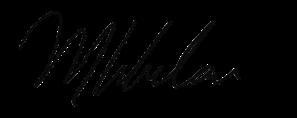
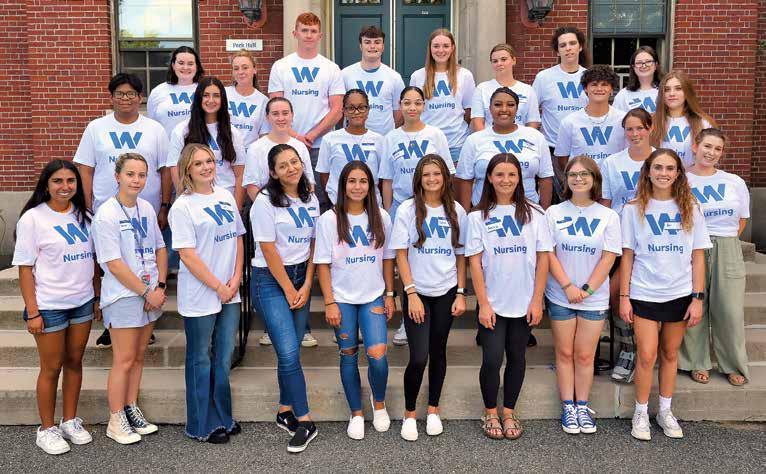
Gathered for a group photo on the steps of Park Hall wearing white T-shirts emblazoned with a giant blue “W” across the front, they looked like superheroes getting ready to take on the world. In a sense, they are.
As Wheaton’s inaugural nursing program class, the 36 students who started the fall semester on Aug. 29, 2023, are embarking on an educational journey that equips them to become problem solvers and will help them address widespread inequities in health care in a supercharged way—armed with an interdisciplinary liberal arts education that emphasizes the strength of diversity, equity and inclusion in health care.
The college’s new four-year bachelor of science in nursing degree program was
officially launched in 2022. The first class of students was welcomed on Sunday, August 27, 2023, at a dinner held in the Wooley Room in Mary Lyon Hall.
They heard from several college leaders, faculty and staff members, who offered remarks and infused the room with excitement.
“Today, we are celebrating the vision of the college for embracing this new nursing major and all those who made it possible. But, most importantly, we are celebrating you, our nursing students who
have entrusted us with your education and success,” Colette Dieujuste, dean of nursing, told the students.
“The opportunity to watch you grow will be energizing, inspiring and, at times, challenging, but we will succeed,” she said. “We are committed to preparing you to be highly skilled nurses, compassionate in the care that you will give both locally and globally.”
In addressing the group, President Michaele Whelan shared that her mother was a psychiatric nurse, so she grew up hearing about her patients and the care and dedication that her mother had for them. Whelan also noted the appropriateness of hosting the dinner in Mary Lyon Hall, which opened in 1849 and was the site of the school’s first science laboratories.
“It was the first building on campus set

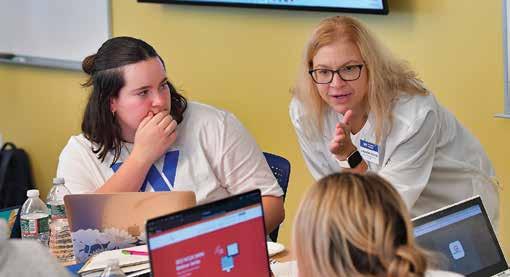
aside solely for teaching and I believe it has one of the longest continuously operated classrooms in the United States,” Whelan said. “You, as the inaugural class, are joining in all these firsts. … We have the utmost confidence in you. I know you are going to do wonderfully well.”
Other speakers included: Darnell Parker, vice president for student affairs and dean of students; Walter Caffey, vice president for enrollment and dean of admissions and student aid; Karen McCormack, interim provost and vice president of academic affairs; Laura
Ekstrom, associate professor of biology and neuroscience; Bonnie Charland, associate director for quality management at VA Boston Healthcare System; and Judy Beal, dean and professor of nursing emerita at Simmons University. Charland and Beal are members of Wheaton’s Nursing Advisory Board.
On Monday, August 28, the students participated in an all-day orientation session in the Diana Davis Spencer Discovery Center Dedicated to Free Speech and Innovation. They spent the day reviewing Wheaton’s nursing policy, receiving guidance on how
to be successful and being introduced to a learning and testing platform.
The nursing students hail from all over the country, including California, New Jersey and Virginia, but share a drive to be of service to a world in need.
Savanna Vargas ’27 said she was drawn to Wheaton by the brand new nursing suite, advanced technology, equipment and simulation labs, as well as the people.
“During my visits, I was welcomed by kind staff and students. And what really sealed the deal was the nursing faculty's determination for a successful Class of 2027 of nurses,” Vargas said. “They truly showed with more than words their commitment to our futures beyond our time here at Wheaton. The school offers numerous resources and opportunities for lifelong success—and even opportunities to study abroad while being in this major.”
“I aim to be a force for change in nursing, tackling the worldwide need for patient care. I'm eager to help ease the issue of understaffing in hospitals. I believe every patient deserves top-notch care and I'm dedicated to making that happen,” Vargas added. “I am most excited to get into the simulation labs and take the opportunities to study abroad to get more knowledge and experience in different places.”
The desire to do something that is not only personally beneficial but also helps others is what drew Iriah Mcclean ’27 to enroll in the nursing program.
“Growing up I’ve always wanted a job where I could help people,” Mcclean said. “To me, it wouldn’t feel right if I wasn’t helping people out. I also love science and math, so that played a part as well.”
Mcclean’s career goal is to start out as a registered nurse and then specialize.
Sophia Newcomb ’27 also has always loved science. “But I didn’t want to be a scientist or do anything in that realm,” Newcomb said. “I like helping people, so I figured nursing would be good. And I was going to come to Wheaton to play field hockey and I heard about the nursing program, so I thought, perfect.”
—Sandy Coleman
Students at Wheaton now have the option of majoring in two more dynamic fields with great career potential: marketing, and digital media and communications. The programs equip students with in-demand skills while they benefit from Wheaton’s distinctive multidisciplinary, experientialoriented liberal arts education.
The programs are Wheaton’s latest crop of new offerings. The college recently added majors in nursing, design and criminal justice.
Wheaton’s new marketing major, administered by the Business and Management Department, provides students with the core knowledge and skills needed to thrive in the global marketplace. Marketing majors will participate in a mixture of experiential learning and project-based opportunities, including a required internship.
“The new marketing major capitalizes
“The new marketing major capitalizes on the synergies between the business and management program and other programs of study.”
Leanna Lawter, associate professor and chair of business and management
on the synergies between the business and management program and other programs of study,” said Leanna Lawter, associate professor and chair of business and management. “Through an interdisciplinary course of study, students gain meaningful knowledge and skills in marketing fundamentals across three areas—creative development, analytics and psycho-social trends. Our faculty are researchers and practitioners with expertise in advertising,
Wheaton’s new digital media and communications major is part of the college’s Department of Film and New Media Studies. The program prepares students for careers in the evolving world of communications, social media and digital platforms.
“The major combines the study of a number of fields including marketing, communications, data visualization and digital tools, bringing the best of a liberal arts education with preparation for a growing number of careers,” said Karen McCormack, interim provost.
“Students will learn to solve communications problems and to understand the legal, cultural, social and ethical contexts critical to effective action in the world of digital media,” she said.
—Laura Pedulli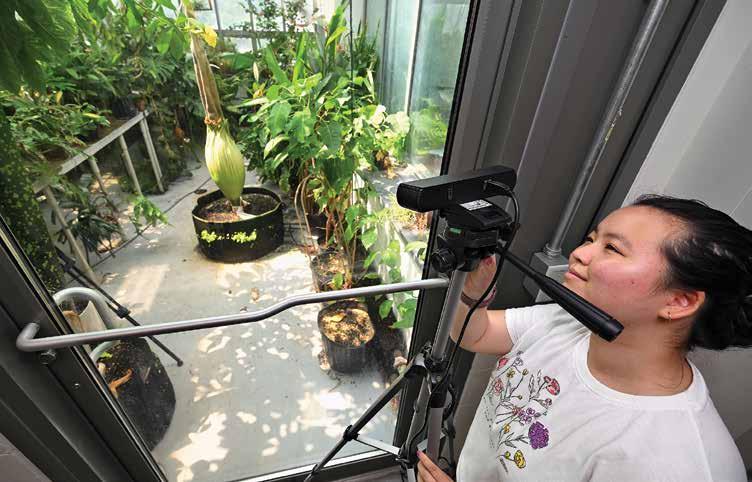
Media Services Director Ellen Kane hired Sarah Joyce ’25, a bioinformatics major, for a work-study position her first semester at Wheaton and Joyce has since continued in the job during the academic year. Last summer, she also was hired to respond to time-sensitive calls involving technology issues and supporting events from May through August. She was particularly helpful when the rare (and smelly) corpse flower began blooming at Wheaton and Media Services was called upon to assist with setting up a livestream feed for YouTube in the greenhouse to capture the unfolding event. Joyce was part of the team that researched and prepared for the high-profile livestream that drew more than 300 visitors to campus. Plugging into the power of knowledge: “Ellen had asked me to look into different streaming platforms and
recommend what I thought might be the best to use. I then helped Ellen and Lukas Noreau [a Media Services technician] bring the camera and equipment up to the greenhouse to stream.” Tuning into fun: “I thought that this event was a really cool experience. I also enjoyed watching the flower bloom and was happy to find that it didn’t smell as bad as I feared it might.” Seeing the big picture: “My major is bioinformatics and a big part of that is computer science and technology, so I thought that this job would fit in with that as I would be exposed to new and different technologies. I have stayed because I have loved working with Ellen, and I have loved getting to learn all sorts of different things about technology on campus.” Monitoring stress levels: “The biggest lesson I have learned is patience, both with people and technology. I have
also learned to be calm under lots of pressure and stress. Sometimes, with big events where we are being pulled in every direction and we just need to get everything done at once, it can be really difficult. So, I have learned to take a deep breath and do one task at a time until all are done.” Building a framework for success: “I’m not sure what I want to do yet, but I know that this job has really helped me build a lot of skills I will need in my future workplace. I have learned how to effectively work with and sometimes lead a group of my peers. I have done training for many of my peers and will continue to do so as I am now an upperclassman and will be taking more of an active role in helping to train and guide other students on shift with me when our supervisors are unavailable.”
—Sandy ColemanWheaton’s Compass Curriculum encourages students to practice putting their knowledge to work through experiential learning and internships. As part of The Wheaton Edge, students are guaranteed access to internship funding to help position them for success after graduation. Last summer, 167 students gained valuable skills through research with faculty on campus, study abroad trips, fellowships and internships at nonprofits, government agencies, businesses, and more.
Audrey Spina ’17, assistant director of Career Services at Wheaton, provides a by-the-numbers look:
102 students in approved and funded offcampus experiences for summer 2023
23 students researching with faculty (across 10 departments, including psychology, biology, English, political science, computer science, art history/ museum studies, religion, music, film and new media and physics/astronomy)
32 students on faculty-led trips (in four countries: Iceland, Madagascar, Ireland and Ecuador)
8 Davis International Fellows (in six countries: Spain, Ecuador, Ireland, Kenya, Denmark and Brazil)
2 Porter Cleveland Fellows
A few students who had internships include:
Abbey Mitchell ’25, National Marine Life Center, Bourne, Mass.
T’nysha Peete ’25, Riverside Community Care, Somerville, Mass.
Finn Towle ’24 , Boston Public Market
Amelia Butler ’24 , digital marketing firm, Dublin, Ireland
Charlie Racine ’25, Naples (Fla.) Zoo
Melina Masseli ’24 , International Medical Aid, Mombasa, Kenya

Katalyn Foster ’24 , MEG in Dublin, Ireland
Erin Billinger ’25, People’s Alliance, Maine
Darin Sweet ’25, Zealand University Hospital in Copenhagen, Denmark
Peter Baier ’25, ThinkerAnalytix, virtual from New OrleansA surgical anastomosis is a suturing technique that doctors use to make a new connection between two body structures that hold fluid, such as blood vessels or bowel. Wheaton senior Jackson Elwell, a biochemistry major on a pre-med track, learned the challenging technique while spending a semester studying abroad in Copenhagen, Denmark.
It was just one of the many skills he gained in the “Human Health and Disease: A Clinical Approach” program offered by DIS Study Abroad in Copenhagen, in which courses were taught by practicing physicians in a Danish hospital from January through May 2023. Elwell also experienced the energy of the hospital and learned how everything functions.
“Surgical anastomosis requires very fine technique, with the sutures remaining within the thin line of tissue on the outside of the intestine, with any errors leading to possible internal bleeding, leakage and infection,” Elwell said. “It was not a technique that I could master in a day to be able to perform it on my test. I had to practice a lot with my suture kit. But, by the final exam, I improved a lot and was one of the first to finish it on the exam.”
“The program was an amazing
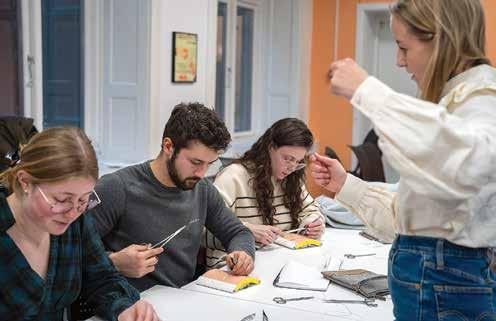

experience,” he said. “One of the more notable moments in Copenhagen was my visit to Herlev Hospital, where we practiced simulated emergency medical situations and had to quickly assess and decide on the best route of care based on the symptoms. It was a great experience, especially because I am a certified EMT and I would like to become an emergency medical physician.”
Elwell’s interest in the medical field stems from his time spent in a hospital as a patient. When he was 17, the hip pain he had been experiencing was diagnosed as avascular necrosis. In this condition, there is a lack of blood supply to a bone and the bone dies. His right femur bone already showed significant collapse.
After two unsuccessful surgeries to
save his hip, he underwent a total hip replacement at age 18—one month before starting at Wheaton.
“Medicine has been lifechanging for me … and I want to be able to do that for other people’s lives,” he said.
After finishing his coursework in Copenhagen, Elwell began a global health internship in Quito, Ecuador, with Child Family Health International as a funded Davis International Fellow in June 2023. He lived with a host family and shadowed health care professionals for five weeks. He also worked at a clinic in Otavalo, Ecuador.
His spring and summer in Denmark and Ecuador moved him closer toward his goals, as well as taught him some lessons about himself.
“I thought that to get into med school and pursue my goals, it was about innate intelligence and understanding concepts on the first try. During the Denmark program I saw that, while this certainly helps, resilience and perseverance are just as important,” he said.
—Sandy Coleman
Darin Sweet ’25 and Emily Carmel ’24 have expanded their academic horizons overseas as recipients of the Benjamin A. Gilman International Scholarship.
With support from the scholarship, Sweet spent the summer of 2023 conducting scientific research and taking a course in Denmark and Sweden; Carmel spent the fall in Montpellier, France, studying the French language and culture.
The Gilman Scholarship is a U.S. State Department program for college students who are U.S. citizens and Pell Grant recipients. The program—which awards up to $5,000 per student—aims to provide more equitable access to international experiences. The students applied for the scholarship with assistance from Wheaton’s Center for Global Education.
Sweet, a biochemistry major, spent nine weeks living in Copenhagen, Denmark, and serving as a research assistant studying age-related macular degeneration at Zealand University Hospital. His research mentor was a University of Copenhagen professor and chief physician in ophthalmology at the hospital.
“I am specifically interested in ophthalmology, which deals with the diagnosis and treatment of eye disorders, due to having eye issues of my own. I have learned more about this field through my Wheaton courses. It fascinates me how we can take in and process visual information, and how this can be disrupted by certain diseases and disorders,” Sweet said.
In addition to gaining knowledge in ophthalmology, the research opportunity enabled Sweet to develop skills using new software that collects data from patient scans into a computer. He also expanded his ability to write research papers and present scientific information, which was part of the experience.
“This opportunity has confirmed that I want a career in either medicine or medical
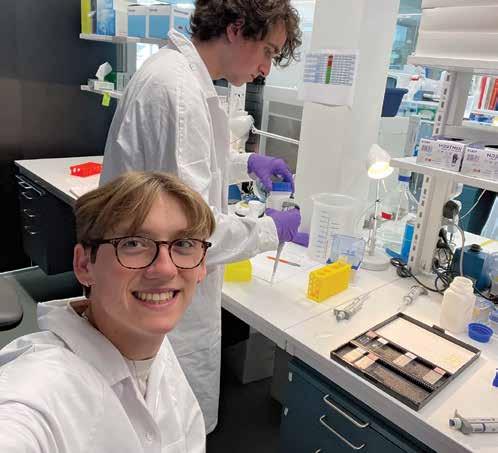
research. The data that I collected will be used in a large-scale project I am doing, and it is really fulfilling and exciting to know that I have contributed to making a difference in the medical field,” Sweet said.
Following his research assistantship, Sweet spent three weeks in Stockholm, Sweden, taking a molecular and cellular neuroscience course.
Carmel headed to Montpellier, France, to study French language and culture through a University of Minnesota program. In the program, students take classes entirely in French.
She started taking French classes in second grade and hopes to become fully bilingual. Carmel, a theater major, plans to explore careers in the arts. She also is a
singer and songwriter who is a member of Wheaton’s a cappella group The Blend.
“While trying something new can be difficult, I am eagerly looking forward to fully immersing myself in the language and culture in Montpellier. It would be an environment where I couldn’t revert to communicating in English. This is exactly what I need to become bilingual truly,” she wrote in her scholarship proposal.
As a first-generation student, Carmel’s scholarship ensured her access to a study abroad experience.
“I know that I will come back from this experience a stronger, more capable person than I ever believed myself to be,” Carmel wrote.
—Laura Pedulli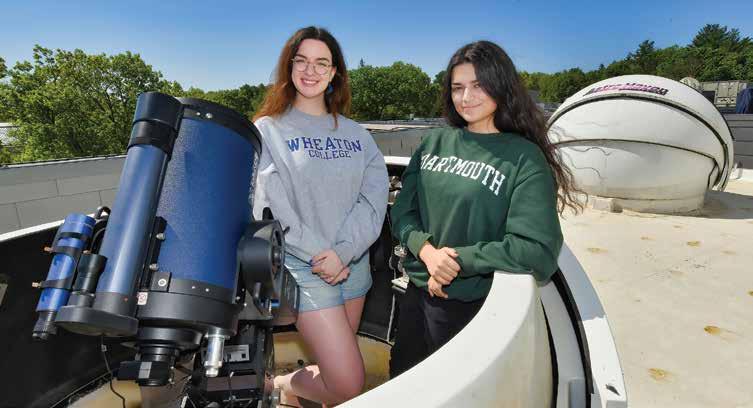
Physics majors Clara Quintanilha ’23 and Nina Christenson ’23 last summer interned at two of the most renowned space research institutions in the world: the NASA Jet Propulsion Laboratory’s Electric Propulsion Lab in Pasadena, Calif., and the NASA Goddard Space Flight Center in Greenbelt, Md.
In her role, Quintanilha performed flight qualification testing for a model of the magnetically shielded miniature hall thruster—which provides path correction and guidance for crafts traveling into or beyond Earth’s orbit. Christenson’s focus was calibrating the imaging sensors of the Nancy Grace Roman Space Telescope, which is set to launch in 2027.
“In addition to gaining exciting handson lab experience, I’ve been able to meet many incredible people working on various missions and projects that are at the forefront of aerospace engineering and space exploration,” Quintanilha said.
Both aspiring engineers, the women are making strides toward their dream careers thanks to a partnership between Wheaton and Dartmouth College’s Thayer
School of Engineering.
The five-year program allows students to reap the benefits of Wheaton’s distinctive liberal arts education while furthering their studies in engineering at Dartmouth. Students spend their first, sophomore and senior years at Wheaton and complete their junior year and a fifth year at Dartmouth College—earning bachelor’s degrees from both institutions.
Quintanilha and Christenson, recent Wheaton graduates, started attending Dartmouth in fall 2023 to begin their fifth and final year.
Professor of Physics John Collins, who advises the program, said it evolved from the Twelve College Exchange Program, which decades ago allowed Wheaton students to earn credit at a dozen sister institutions. Since the early 1990s, the dual degree partnership has allowed motivated Wheaton students willing to meet a set of challenging prerequisites to earn an engineering degree at Dartmouth College.
“Students come to Wheaton interested in engineering, but not quite certain. This allows them to learn more about their
interests,” Collins said.
Over the years, dual degree graduates have secured engineering jobs and many continue on to earn master’s degrees in physics and engineering, according to Collins.
For Quintanilha and Christenson, the opportunity to study engineering was an added bonus of attending Wheaton. With Collins’s encouragement and support, they completed the courses necessary for acceptance into the dual degree program.
After two years at Wheaton, they joined a cohort of students who spent their third year at Dartmouth College. The two students equated it to “junior study abroad,” as the experience required immersing in a new academic culture and campus experience.
At Dartmouth, they engaged in handson technical projects and had access to facilities, including a machine and fabrication shop, specifically designed for students planning careers in engineering. Both students focused their studies on fluid mechanics—essential to aerospace engineering.
—Laura PedulliCaitlin Perrigo ’24 considers herself both an artist and biologist, and frequently endeavors to bridge those two worlds.
In high school, she painted a vibrant mural of a lush jungle with an array of plants, mammals and insects on the science classroom door. Years later as a Wheaton student, she created biological illustrations of the college’s taxidermied bird collection, using her knowledge as a double major in visual art and biology.
So it is perfectly fitting that Perrigo is among the 2023 winners of the prestigious $35,000 Beinecke Scholarship. The award will allow her to continue to develop her artistry through a scientific lens in graduate school.
The Beinecke Scholarship is a nationally competitive program that enables students of exceptional promise to pursue opportunities and to be courageous in the selection of a graduate course of study in the arts, humanities and social sciences. She is the 11th student from Wheaton to win a Beinecke.
“Being one of the selected winners of the Beinecke Scholarship means everything to me and my aspirations. It means that I can continue my education and pursue my goals without financial constraints. I had originally questioned whether graduate school was possible for me, but now I can confidently go to graduate school with no hesitations,” Perrigo said. “I feel extremely grateful for this opportunity and for all of my professors who helped me along the way.”
As a future graduate student in an M.F.A. program in illustration, Perrigo
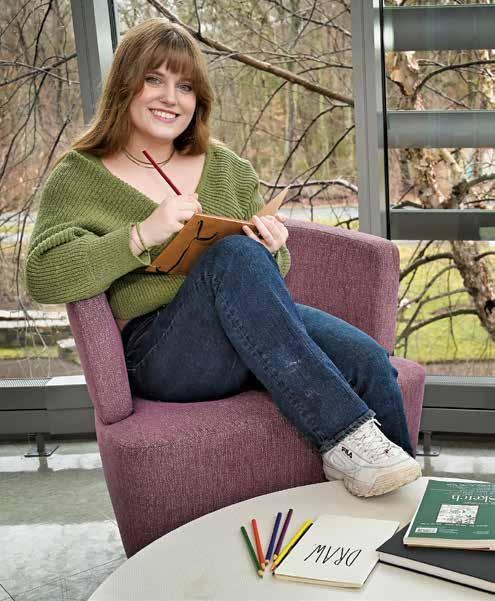
hopes to develop botanical and zoological illustrations focusing on hand-created imagery that better intertwines art and science than digital imagery.
“I want to impart scientific knowledge through my illustrations, but I also want to evoke an emotional response in the viewer. I’m curious to know the extent we can infuse surprising aesthetic elements into biological illustration to start conversations, inspire new courses of action and grow an appreciation for the natural world,” she said.
As a student, Perrigo has immersed herself in biological illustration. After Associate Professor of Biology Jessie Knowlton noticed her spending hours drawing the taxidermied bird collection,
she recommended her for an internship at the Massachusetts Audubon Society’s Stony Brook Wildlife Sanctuary.
Perrigo also has received guidance from Professor of Visual Art Claudia Fieo; she has served as both the professor’s teaching assistant for the course “Printmaking for Social Change” and her studio art assistant.
Fieo said Perrigo’s richly attuned sensitivity has enabled her to succeed so impressively in her courses.
“In ART 205: Drawing II, Caitlin submitted an oversized charcoal and graphite drawing that was simply breathtaking in skill, having taken over 40 hours to draw,” Fieo noted.
—Laura Pedulli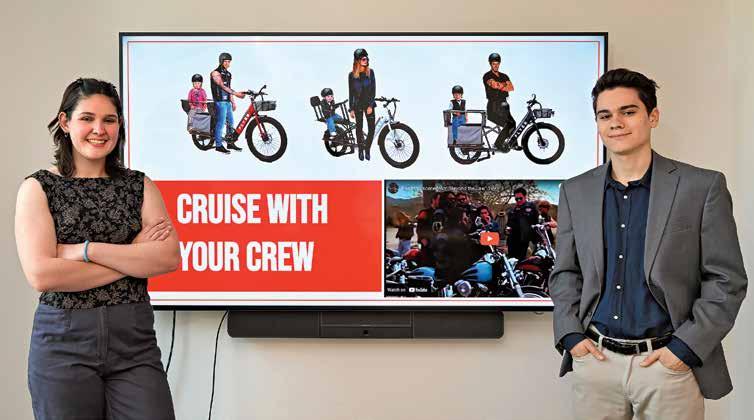
When assigned to promote Radio Flyer electric bikes for a global marketing pitch competition during the spring 2023 semester, Lily McDowell ’24 and Vincent Versteeg ’24 envisioned a whole new way of experiencing the product.
One of their ideas: a “Cruise with your Crew” advertisement, with parents and their young passengers in motorcycle gear cruising through their neighborhood on e-bikes. The fun nostalgic campaign paid tribute to ’80s movie tropes, with families sidling up to schools like biker gangs.
Their creative idea impressed a panel of industry professionals at Purdue University Northwest’s College of Business digital marketing competition last spring. McDowell and Versteeg won eighth place out of 242 teams from around the world for their pitch.
C.C. Chapman, senior professor of the practice of business and management at Wheaton, requires students in his “Digital Marketing” course to participate in the Purdue competition.
In addition to their “Cruise with your
Crew,” McDowell and Versteeg’s pitch featured extensive market research and proposed a van to visit public places across the U.S. to allow potential consumers to test out the Radio Flyer e-bikes.
“I really enjoyed putting together our slide deck at the end of our project. We had worked hard on all of our ideas and finalizing graphics, so putting it all together was easy and awesome to see come together,” said McDowell, a business and management and visual art double major.
She credited Versteeg with coming up with the concept of the “Cruise with your Crew” biker gang advertisement.
“We brainstormed for a long time about different ways we could attract customers to these e-bikes and settled with a humorous commercial. The idea came as a play off of biker gangs in movies as we were thinking about comparing the e-bike to motorcycles as a form of transportation,” she said.
Versteeg, who is majoring in business and management, said humor makes advertisements more memorable—and effective.
“Growing up, the ads I liked the most were those that tried to be funny or clever or just entertaining in some way. If you’re going to try to take something from the viewer—their money—then you should also give them something in return—a laugh,” Versteeg said.
Both McDowell and Versteeg are thrilled by their success in the competition.
“We are happy with how well we did. We put a lot of hours into this project outside of class and it paid off,” said McDowell.
The experience helps lay the foundation for careers in marketing, they said.
“Having real-world experiences like this in class is one way for us to stand out after Wheaton to employers. I want to go into marketing, and potentially graphic design, and this opportunity made me feel like I am going in the right direction,” McDowell said.
“This experience made me feel more confident about pursuing a career in marketing, which is my concentration,” added Versteeg.
—Laura PedulliA T-shirt is not just a T-shirt. With or without words, the garment, like everything we wear, is a fashion statement that speaks to who we are, who we want to be or who we want others to think we are. During the fall semester, Clinton O’Dell, associate professor of theatre and resident scene and costume designer, taught a First-Year Experience (FYE) class that delved into this subject. The course, “Fashioning Selves: Dress and Identity,” explored fashion, clothing, appearance and identity for students to gain a deeper understanding of the complex and interconnected topics. We asked O’Dell some questions about his class and the role fashion plays in self-expression and influencing perceptions.
What led you to create this class?
“I created it because it focuses on subject matter that I love, but that I don’t get to touch on as often with the responsibilities I have in the Theatre and Dance Department. A lot of what I do is in service to a production, but, in this case, this is not about theater. It’s not about stage production or costume design for a character. It’s a much more societal viewpoint about how we view ourselves, and how fashion lets us get to know ourselves and how it lets other people get to know us. That really is a fashion studies/cultural studies standpoint, much more so than a costume design standpoint. That lets me bring in history and sociology perspectives.”
How does clothing reflect identity?
“‘How does it not?’ is maybe a better place to start. It’s such a complex set of identities that are always intersecting. We’re never one thing at any one time. We are always multiple identities intersecting and embodied all in the same moment. The way our clothing lets that come forward or sometimes masks that, depending on the circumstance, could happen in any number of ways. It’s generational. It’s about what is available to us; we can’t
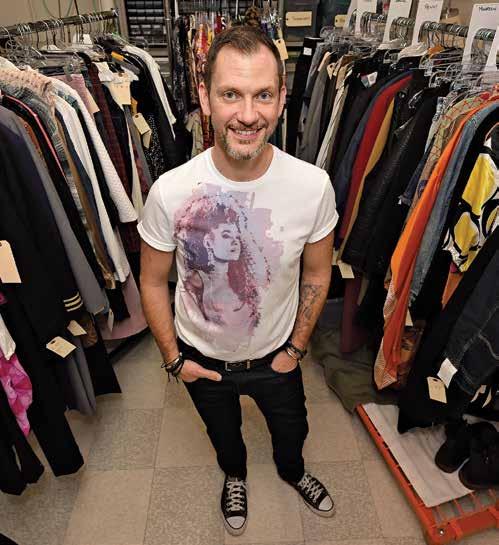
wear what we don’t have. It’s location based in some ways, and it’s always about creating a sense of belonging or a sense of differentiation—signaling to others that you are a part of some group. Signaling to others that you’d like to be a part of that group or, in a more rebellious or contentious way, you might signal that you are not a part of that group. … We signal gender, we signal race and ethnicity, we signal sexuality, we signal social class. And we don’t always tell the truth, which is one of the most wonderful things about fashion—it lets us be someone for a day
and see if we like that. And, in that sense, it also helps us find more specifically who we are. So, there are a million different windows into how clothing reflects identity, but always with the fact that it is an embodied practice. Our body itself is the thing that becomes the mechanism for communication.”
What
“Always with first-year students, one of my main goals is just to expose them to as many things as I can, because we
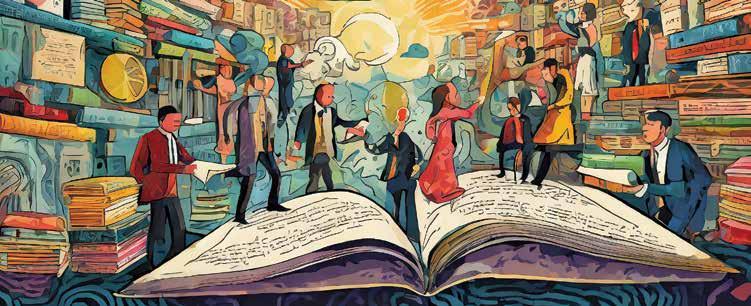
Hope Bastian, assistant professor of anthropology, was awarded a Hunt Postdoctoral Fellowship Grant from the Wenner-Gren Foundation in September 2023. The highly competitive fellowship provides a stipend of up to $40,000 for nine months of full-time writing. The foundation awards a maximum of 20 of the fellowships annually worldwide.
Delvyn Case, professor of music, was quoted extensively in the article “How Lil Nas X Repurposes Christian Imagery in ‘J-Christ,’” published in Time magazine in January.
Geoffrey Collins, professor of geology, co-wrote with Ishaan Madan ’22 , technical solutions engineer at Epic, the article “Characterizing phase transitions for Titan’s surface molecules: Implications for Dragonfly ” published in Planetary and Space Science in December 2023. Madan was the lead author on the article, which is based on his senior thesis.
John Collins, professor of physics, co-wrote the article “A statistical model of thermal ionization of excited Ce ions in YAG” published in the Journal of Luminescence in February 2024.
Fatima Jebari, assistant professor of business and management, co-wrote the article “Product recall and CEO compensation: Evidence from the automobile industry” published in Finance Research Letters in June 2023.
Nancy Kendrick, professor of philosophy, and Jessica Gordon-Roth ’04 in December 2023 presented their recent collaborative work at a conference on Early Modern women philosophers held at Monash University in Melbourne, Australia. Their talk was titled “Astell as Cartesian: A Cautionary Tale.” Gordon-Roth is an associate professor of philosophy at the University of Minnesota.
Justin Schupp, associate professor of sociology, co-wrote the article “Hosting a Market Is Just the First Step: Exploring the Relationship
Between Community Characteristics and Farmers Market Size” published in Environmental Justice in November 2023.
Cliften Bonner-Desravines ’13 (known as the hip-hop artist Cliff Notez) in May 2023 was featured on GBH Boston Public Radio talking about his music and the Boston music scene. He also performed.
Jessica Landau ’09, assistant instructional professor at the University of Chicago, wrote “Can Animals Own Copyright? AnimalGenerated Photography from George Shiras to the Monkey Selfie” published in American Art and “Proximity, Wholeness, and Animality: The Case of Little Sorrel’s Repatriation” published in Curator: The Museum Journal in 2023.
don’t know who they are yet and they don’t know who they are yet. And the process of discovery requires seeing stuff. FYE is intentionally designed to be multidisciplinary, so I want to expose them to as many academic disciplines as I can as they’re starting to figure out what
they want. Beyond that, outside of those sort of academic prescribed goals, it’s always my hope that the course will just help the students get to know themselves a little bit better than they did before. Maybe they will walk away thinking that they’re capable of something that they
didn’t think they were capable of when we started. I think the whole point of education is just to find oneself, and then take some action based on what you find. Of course, you have to find yourself first. So if I can help with that, everything else is a bonus.”

Wheaton is adding men’s volleyball to its varsity athletics program. It is the fifth sport added to the offerings within the past year, joining men’s and women’s water polo and men’s and women’s fencing.
The college will conduct a nationwide search to hire a head coach to lead the program in early 2024.
“Wheaton is excited to add the growing sport of men’s volleyball to our portfolio of varsity sports,” said Gavin Viano, associate vice president for athletics and strategic programs. “Women’s volleyball
was one of the original Wheaton NCAA sports established by the college in 1974. As we celebrate the 50th anniversary of our women’s program, we’re excited to begin this new chapter within the sport of volleyball with the establishment of our men’s program.”
The Lyons’ men’s volleyball team is
slated to begin competition during the 2025–26 academic year with a season that begins in mid- to late-January and concludes with the NCAA championship in the final week of April.
There are currently 112 NCAA Division III men’s volleyball programs that compete for the NCAA championship. Additionally, there are four new Division III programs that will commence play in 2024. Wheaton will be the fourth member of the New England Women’s and Men’s Athletic Conference to sponsor men’s volleyball, joining Emerson College, Massachusetts Institute of Technology and Springfield College.
—Athletics Staff
The Lyons Insider, a weekly newsletter from the Wheaton Athletics Department, keeps you up to date on upcoming events and news, with many stories, interviews, videos and photographs that highlight our teams. We invite you to subscribe using the QR code or at wheatoncollegelyons.com/subscribe.aspx
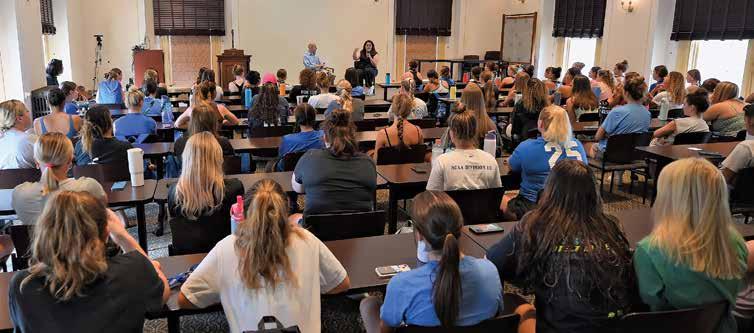
Of all the stories that Andrea Pelkey ’02, shared with students in a wide-ranging conversation on her career highlights at ESPN, perhaps the one that revealed the secret to her success occurred during her high school days in Palmyra, Maine.
She played on the girls varsity basketball team at Nokomis Regional High School, and after her team played she would “do color commentary of the boys varsity games for the local cable channel,” she said.
That same work ethic was employed at Wheaton, too, where she played on the varsity field hockey team and worked in the college’s Sports Information Department, writing wire copy on her team’s games and filing the stories with The Boston Globe and the Boston Herald
She told a group of more than 80 students and student-athletes gathered in the Holman Room in Mary Lyon Hall in September 2023 that being a team player helped her make big opportunities for herself.
“You have to have a willingness to do whatever it takes,” she said. “Work long hours—nights, weekends and holidays. Take on weird assignments. For a 6 p.m. live report from Gillette Stadium, I would get there at 4:30 in the morning. Not everybody wants to do that. I think being
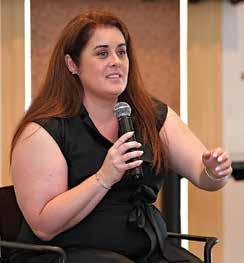
on a team and doing what it takes to win a game—has helped me along the way.”
Pelkey began her ESPN career on “SportsCenter” and “College GameDay.” She quickly excelled in covering breaking news in the field. She spent 14 years covering some of the biggest news and features in the NFL and NBA, as well as the Women’s Final Four and NASCAR. She put herself through a crash course to learn everything she needed to know about NASCAR drivers, their cars and their sponsors, almost overnight.
“I made flashcards and quizzed myself. It was such a great opportunity,” she said.
In addition to covering six Super Bowls and 11 NBA Finals, she worked in the NBA Bubble at Disney World during the pandemic. In 2013, Andrea reported from the scene of the Boston Marathon bombing, just blocks from her apartment. After a promotion to the executive ranks, she is now back in the studio as a coordinating producer of the network’s flagship program, “SportsCenter.”
“When I started out, women were still taught to keep our heads down and move forward. That has changed over the years. The world has changed. My recommendation now is to talk about your experiences. Ask why you might be described as ‘pushy’ but the word ‘stern’ is used to describe your male counterpart.”
She said talking with Jackie MacMullan, a Boston Globe sportswriter and ESPN commentator, helped her sense of belonging, despite often being one of the few women in the locker-room.
“She and I spoke about this in depth. You shouldn’t have to prove yourself to others in order to belong. You only have to prove yourself to yourself,” said Pelkey, who majored in sociology at Wheaton and has remained close to her field hockey teammates, often taking trips to Europe with them.
—William Walsh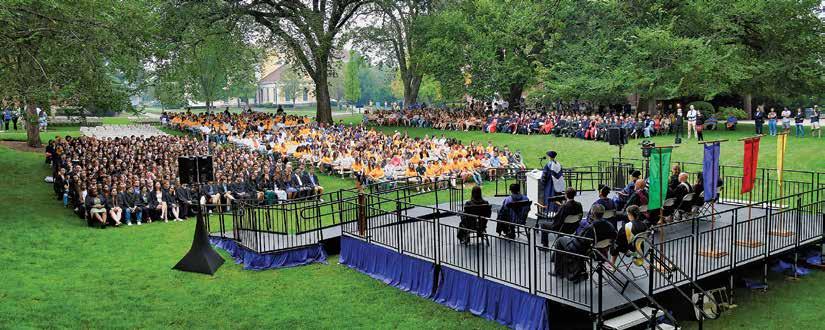

Students arrived on campus with boxes and big smiles to start the 2023–24 academic year. The packed schedule of activities included move-in, intercultural icebreakers, a welcome ceremony for new students, community service, the candlelighting tradition, Opening Convocation and photo sessions for first-year students and new members of the classes of 2025 and 2026.
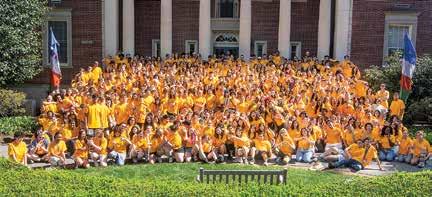
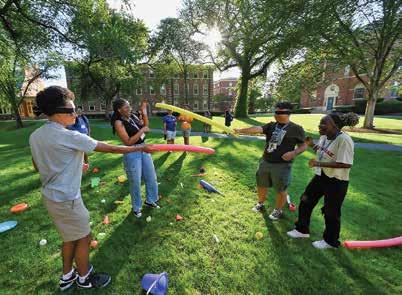
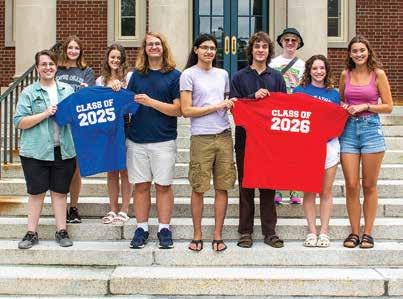
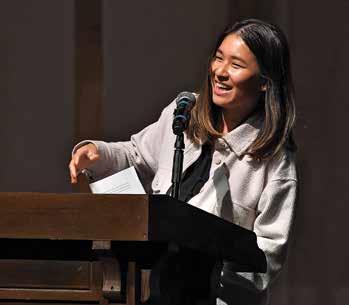
The English Department in October 2023 presented the “Many Voices, Many American Poetries Festival,” a two-day event celebrating the different representations in American poetry. The festival drew poets from across the country. Olivia Lee Rui ’23 (pictured) and Cheyenne Bates ’20 shared original work at the gathering in Weber Theatre.
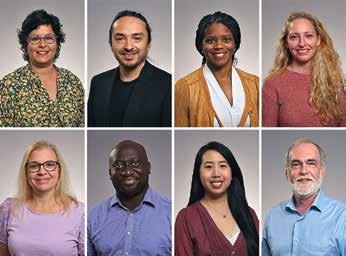
Wheaton welcomed new faculty members this fall: Tania Schlatter, professor of the practice of design; Christhian Diaz Silva, professor of the practice of painting and foundations; Taneisha Vilma, assistant professor of psychology; Katherine Zink, professor of the practice of biology; Lori MartoneRoberts, director of nursing simulation and professor of the practice of nursing; Sam Kwachie, professor of the practice of business and management; Stacy Nguyen, professor of the practice of biology; Dennis Kalob, professor of the practice of sociology, and Michael Nicholson, professor of the practice of biology (not pictured).
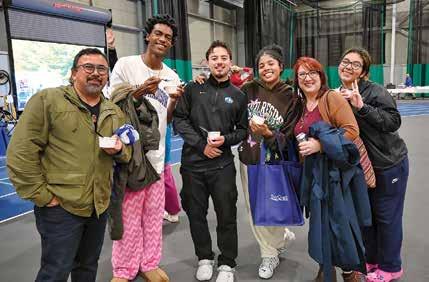
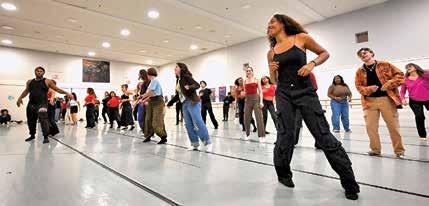
The fall semester was a busy time filled with many events, including the student activities fair, Hispanic and Latine Fest (with dance lessons), Arts Quad Party, Fall Fest and Family and Friends Weekend.
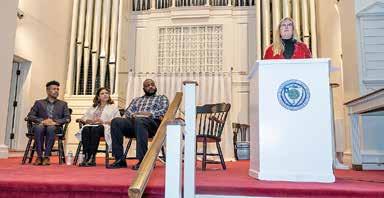
On Oct. 12, 2023, the Center for Religious and Spiritual Life hosted a gathering at Cole Memorial Chapel to stand resolutely against anti-Semitic and anti-Muslim hate and reaffirm unwavering support for students, faculty, staff and the extended Wheaton community, at home and abroad, impacted by the unfathomable losses in Israel and Gaza. Wheaton continues to focus on support and resources for the campus community and holds dear a shared commitment to peace.
Bhutan, a remote, landlocked nation in the Himalayas in South Asia, is 7,490 miles and a 15-hour, 26-minute flight from Boston. However, Wheaton has managed to close the distance and build a bridge of friendship with the Kingdom of Bhutan that for decades has taken students, faculty as well as alumni there to engage in unique opportunities to explore and learn.
Last summer, the Madeleine Clark Wallace Library hosted an exhibition that highlights that mutually beneficial relationship. “Bhutan and Wheaton: Celebrating 25 Years of Friendship and Collaboration,” on display from May 1 through Sept. 8, 2023, showcased the study abroad program and the professors, students and alumni who have taken part.
The program is a partnership between Wheaton and Royal Thimphu College (the first private institution of higher learning there) that provides a rare opportunity for learning and cultural exchange in a country to which few have access.
During the fall semester 2023, six Wheaton students studied there, with Professor of History Dana Polanichka, who was the coordinator of the Wheaton-Royal Thimphu College Partnership Program during the semester.
President Michaele Whelan initiated the library exhibition in collaboration with Center for Global Education Dean Gretchen Young, Library Services Dean Megan Brooks, and Beard and Weil Galleries Director Elizabeth Hoy.
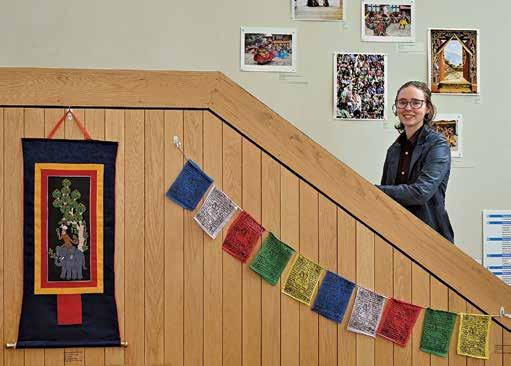
Students Isabel Mayers ’24, Shuchang Gu ’23, Emmanuel Leal ’23 and Chogyal Norbu ’23 also worked on the project.
“Besides the important topic covered in the exhibition—celebrating the relationship and exchange of people, ideas and cultures of Wheaton and Bhutan—this exhibition allowed Wheaton students to apply their coursework to a real-life situation,” said Brooks.
Norbu, a native of Bhutan and a 2022 recipient of a Projects for Peace grant, provided advice to ensure the display of materials was culturally appropriate.
Leal designed the promotional materials and wall text.
Also, “Isabel and Shuchang, who took Art History 335: Exhibition Design, made major decisions about all aspects of the exhibition, including process, timing, placement, handling, mounting and descriptions. Gretchen and I were lucky to learn from them,” Brooks said. “Wheaton is privileged to have this unique relationship with the Kingdom of Bhutan. I’m delighted Wallace library can serve as the backdrop for the exhibition.”
The exhibition included a timeline that

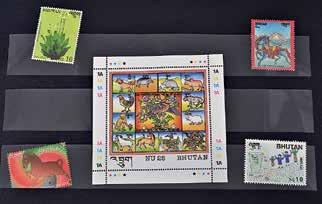
traces the relationship with information and photos of the students, alums and faculty members who have gone to Bhutan over the years. Objects, tapestries, prayer flags and traditional clothing from Bhutan were also featured.
Wheaton has a relationship with Bhutan initially dating back to the 1990s and continuing through a study abroad program first launched in 2010. Wheaton’s connection with Bhutan has existed since the nation’s current king, His Majesty Jigme Khesar Namgyel Wangchuck, was a Wheaton student (from fall 1999 to summer 2001). In a recent cultural exchange on campus, Wangchuk Rinzin taught at Wheaton as a visiting Fulbright Scholar from Bhutan during the 2021–22 academic year.
Teamwork was key to planning and installing the exhibition, the students noted.
“Working collaboratively, sharing ideas and listening to different perspectives made the entire process an inspiring and creatively enriching experience. This collective effort ensured that the exhibition unfolded with a cohesive narrative and offered a deeper appreciation of represented culture,” said Gu, who views art as a way to embrace cultures and perspectives different from one’s own.
“Working on this exhibition was important for me for several reasons. It aligns perfectly with my Wheaton education and future career plans,” Gu said. “As a history of art major, my goal is to pursue a career in the museum field. Being involved in this exhibition provided

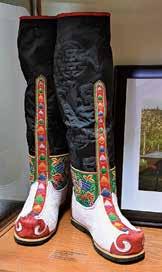
me with valuable hands-on experience in preparing, designing and installing an exhibition for the Wheaton community. I am excited to contribute to this initiative that strengthens the community’s understanding of the Bhutanese culture and our friendship with Bhutan. This experience also deepened my understanding of how to present things beyond their original context while respecting the cultural significance of the exhibited objects.”
Mayers expressed similar sentiments.
“After Wheaton I plan on continuing on a path in which I will have other opportunities to participate in the curation and design of exhibitions. Collaborating in the design of the Bhutan exhibition was a unique experience that provided me with real-world work experience,” said Mayers, a visual arts and history of art
double major.
“The big lesson I learned during this opportunity was how to work with a variety of people with different skill sets and prior knowledge in order to create a public exhibition that proudly and respectfully shows Wheaton’s initiative to provide unique and diverse learning experiences,” Mayers said.
Professor Polanichka noted that study abroad programs and international collaborations are central to Wheaton's mission to provide a transformative liberal arts education.
“For me as a professor, I relish the opportunity to engage with students in ways that simply cannot happen in on-campus classrooms,” Polanichka said. “The connection that arises between students and between students and faculty when sitting on a bus navigating winding Bhutanese roads for six hours, when fumbling through new cultural situations, when white-water rafting in Punakha, when helping to clean a temple, and more cannot be replicated even in my favorite Knapton Hall classrooms. So often through these non-academic moments, we have transformative experiences that enhance and deepen our academic learning as well as our lives and personal development.”
Each summer, Wheaton offers several filmmaker-in-residence fellowships that provide funds for students to travel the world and create films about their experiences. During summer 2023, the fellowship awards were presented to Kaylee Carson ’25, Reka Moscarelli ’25, Sato Murphy ’26 and Elias Stevens ’25.
Carson, who is double majoring in film and new media studies and business
Location: Iceland
Project: Filming the experiences of students doing geology research, resulting in “Wheaton's Geology of Iceland,” a seven part docu-series on YouTube
“In the ‘Geology of Iceland’ course, there were 12 students divided into groups of two who performed research and created different projects that studied Iceland geology. I filmed their journey of executing their projects and seeing how they turned out in the end. I was able to learn about their projects and understand the process of actually executing scientific fieldwork.
“While the scenery in Iceland is absolutely breathtaking, in order to see some of these places, we needed to do some hiking. This was especially difficult because I had to carry camera equipment up these hikes. For example, we did a glacier hike and I had to carry an icepick, shoe spikes and a camera, trying to film everything without slipping.
“There are just so many moments that were inspiring or breathtaking, however a very special one was when we connected with a Wheaton alum [Gizzy Spencer ’20] who was currently living in Iceland! She took classes with the professors and even did the ‘Geology of Iceland’ course when she was at Wheaton. She drove out to meet with us and we were able to have dinner with her and talk about her experiences with living in Iceland. She was able to teach us a lot about her experiences and what she has done since living in Iceland.
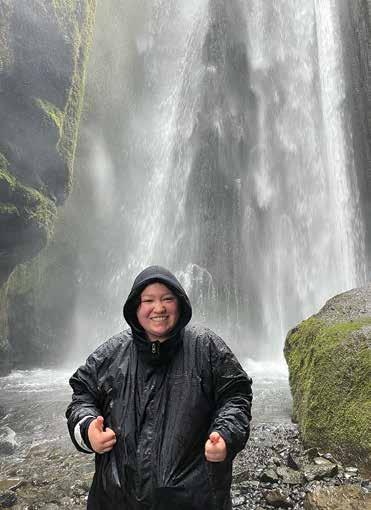
“Every day in Iceland I learned something new about myself including my strengths and weaknesses as a filmmaker. It is an experience that I can forever look back on and grow even further in my filmmaking career.”
and management, traveled to Iceland with Professor of Geology Geoffrey Collins and Professor of Chemistry and Geography Matthew Evans for their course “Geology of Iceland.” Moscarelli, who is double majoring in Hispanic studies and environmental communications and storytelling spent the summer in Ecuador with Associate Professor of Biology Jessie Knowlton and Professor of Anthropology M. Gabriela Torres for
the course “Ecuador, From the Andes to the Amazon: Human Interactions with the Natural World.” Wheaton partnered with the international Fab Lab Conference and Symposium in Bhutan to offer Murphy a fellowship in the Himalayan nation. Stevens was a fellow in Madagascar with Knowlton and Associate Professor of Political Science Aubrey Westfall for the course “Between Peril and Promise: Politics and
Biodiversity in Madagascar.” Murphy and Stevens are majoring in film and new media studies.
After the students returned from their trips abroad, Associate Professor of Film and New Media Patrick Johnson asked each about the experiences. Here are some of the answers he gathered about lessons learned, challenges and favorite moments in his series “Field Notes,” which is featured on Wheaton’s blog.
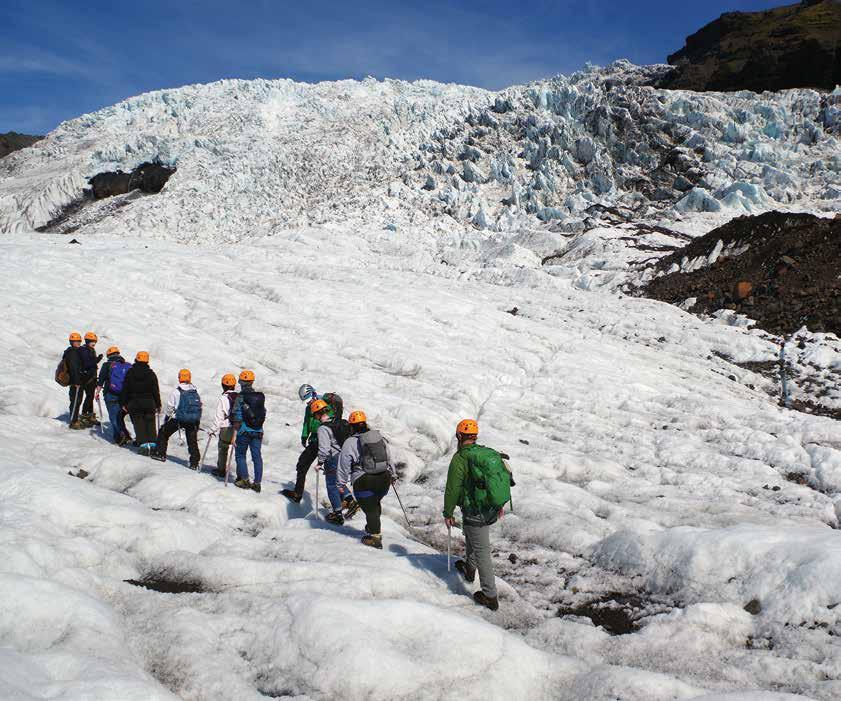
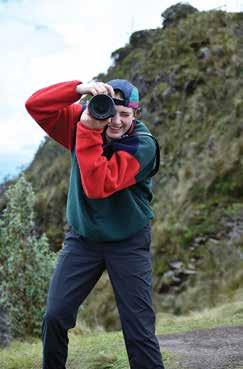
Location: Ecuador
Project: Documentary, focus to be determined
“While I have yet to decide the exact premise of my documentary, I was really focusing on collecting footage related to healing practices in Ecuador and the environmental [and some social] issues that exist in the country. I also tried to get a variety of footage showing the many different ecosystems there, since there are so many types of biomes all located in one relatively small country. The biodiversity, the variety of environments and the range of different stories from everyday people were some of my main inspirations while filming.”
Location: Bhutan
Project: A short documentary about FAB23 Bhutan
“The main project was a 50-minute-long documentary about the International Fabrication Conference that took place in Thimphu, going over both the event itself, as well as the community-driven challenges across the country. The vast majority of my time was spent working on this.”
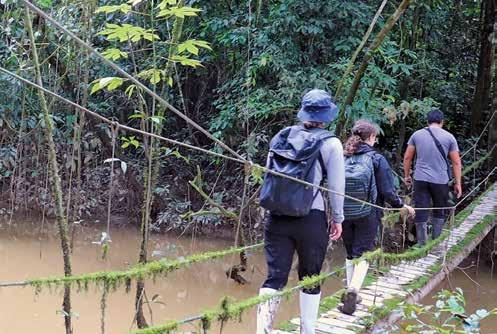
“I learned a lot about organization and being prepared for the unexpected, and how challenging it is to be collecting footage while also interacting in real time with the people and places you are filming. I was often hiking or having a conversation while holding a camera and kind of hoping for the best, trying to balance experience and interaction with getting content.
“This is probably why most documentaries operate with crews! There were also times when people would decline my request to be filmed, and I had to be OK with the fact that I wouldn’t get that footage for the documentary. Overall, I think I got a lot better at knowing what moments to film and what moments I should just be in the experience— whether I was focused on hiking, a
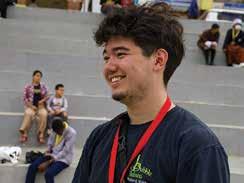
certain conversation, or being aware of my surroundings for safety reasons.
“I want people to know that there is so much value from going out of your comfort zone, from going anywhere—whether it's thousands of miles away or a few blocks from your house—that is different from your day-to-day life.
“Practicing the language was, for me, a significant part of this, as I had taken classes in Spanish for years but hadn’t had many opportunities to fully use it yet. While the U.S. population speaks many languages, it is often not a priority within our education system. But finding any way you can to learn and practice a language is incredibly valuable, as it allows you to learn and communicate with so many more people in the world.”
preparations for the event, and I was also the event photographer toward the very end of the event.”
“An important lesson I learned during the experience was to be self-directed. In this position, I had a very involved job but it wouldn’t be with much guidance along the way. You should plan ahead, set due dates, have contingencies and most importantly get stuff done.”
Location: Madagascar
Project: Documentary on conflicting struggles related to the environment
“When we were in the rainforest, I was of course concerned with keeping equipment dry, so I used a rain cover for my camera. Sand, dirt and dust were small concerns when we were in the spiny forest or other hot, dry environments. In the end, I think a coat of dust and sweat protected the gear from any real damage.
“Beyond that, I was concerned with how my documentation of the Malagasy would impact them. Shoving a camera in their face without permission felt wrong, especially when it was a one-off, unbalanced interaction. I got so much out of it, and they got nothing. Friends on the trip encouraged me to start showing people the photos I was taking of them, and that made such a difference. Many Malagasy people have never seen their own photograph, so it brought them much excitement.
“There are so many grand, large-scale moments of the trip that I could not fathom until actually experiencing them. However, the memory that feels most tender and easy to remember was when we got to tour a traditional Malagasy home in the countryside. We were driving all day to get to our next destination, but on our way we randomly stopped. One of our tour guides, Mihaja, said we were going to get to see inside a home.
“The house was three stories; the first floor was for livestock, the second was
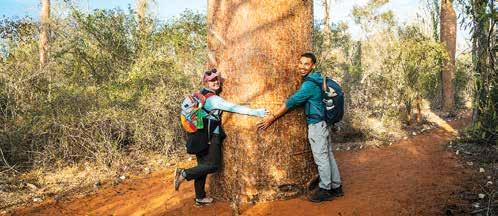
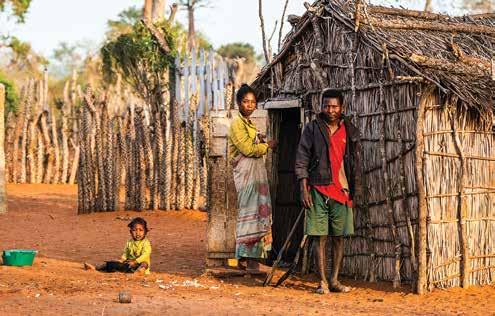
for 10 people, and the third was for four people. On the third floor, the grandmother of the household sat and smiled as we looked around the small, low-ceiling home. I asked her if I could take a picture of her, and after Tojo [our other tour guide] translated for her, she laughed! She
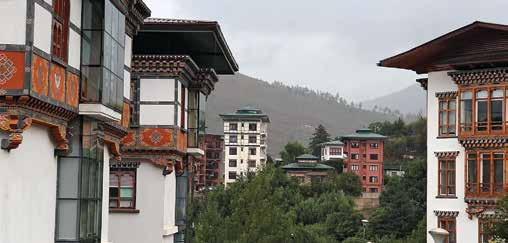
smiled a nervous smile, then nodded.
“That photograph is one of the most important photos I took on this entire trip. I wish I knew her name. My excitement, nerves, and lack of familiarity with the language got in the way of proper introductions. Whenever I travel, I now know to make sure I get the names of people I document, to the best of my ability. Apparently, Mihaja asked that family on the spot if all of us could tour their home, and they just said yes. It went to show how hospitable the Malagasy are.”
Read more on Wheaton’s blog (wheatoncollege.blog/academics/ film-new-mediastudies) or use the QR code and read the “Field Notes” interviews.
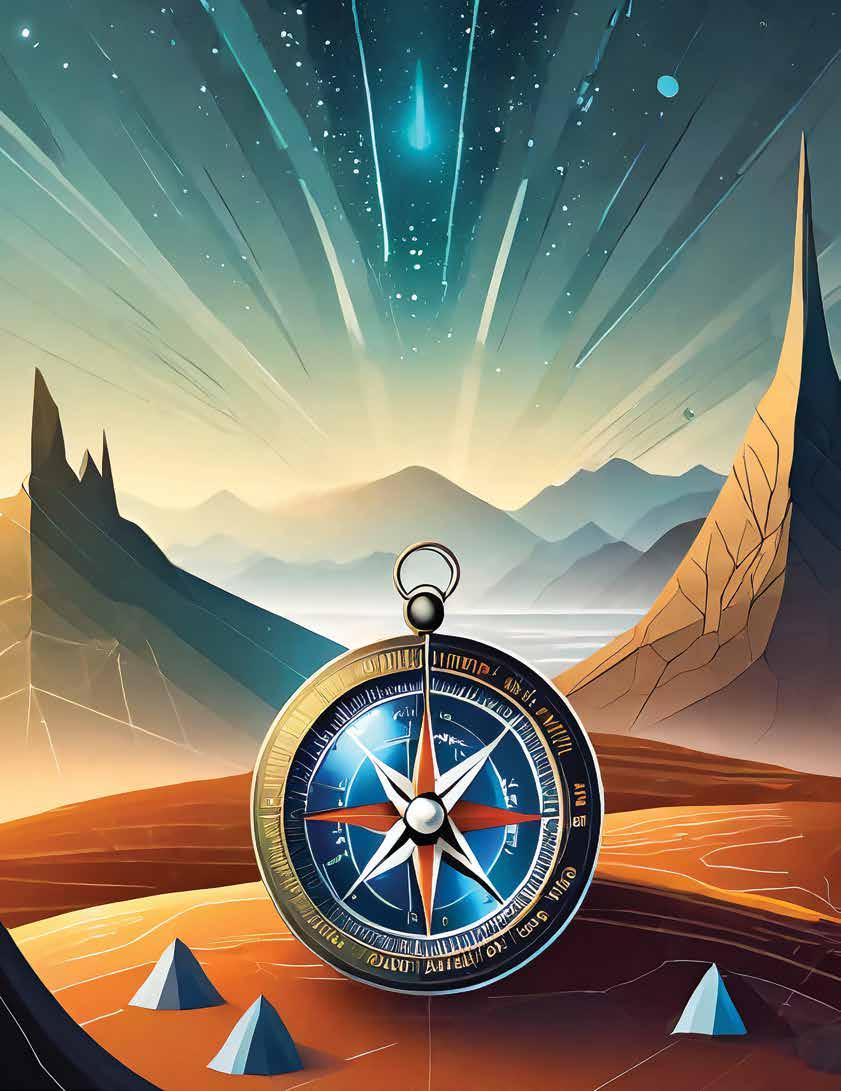
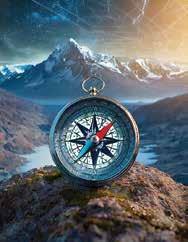
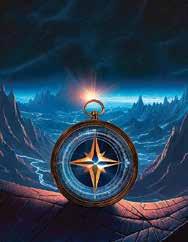


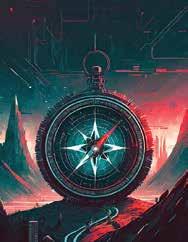
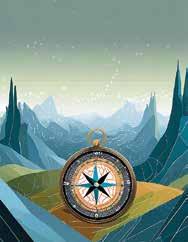



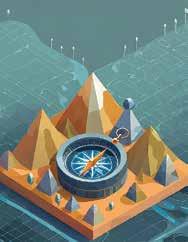
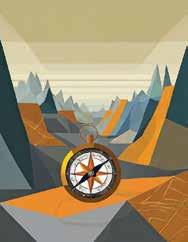
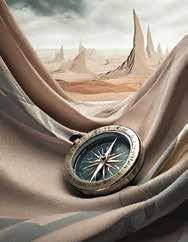
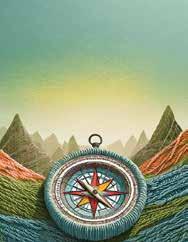


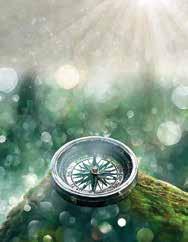
As a student in Wheaton College’s “Digital Marketing” course, Amelia Butler ’24 needed to make a marketing pitch deck to be entered into a global business competition. The challenge: create a promotional plan for a product called Sole Search that parents can use to track their children’s locations.
The final presentation from Butler and her teammates stood out for the many pictures it contained to illustrate their vision—all of which were created using artificial intelligence by typing phrases such as “kid walking alone to school” and “kid walking alone in the city” into the image-generation programs Canva and Midjourney.
“These really helped our campaign,” Butler says. “If you don’t have the budget

or resources to create real-life images, pictures or videos to launch a product, or you’re just starting out as a business, AI definitely is an advantage.”
All of the images on the left were generated with the AI program Adobe Firefly using the prompt “navigating with a compass a futuristic frontier landscape.”
The team came in third in the Fall 2023 Digital Marketing Competition hosted by Purdue University Northwest’s College of Business.
The competition is just one way Senior Professor of the Practice of Business and Management C.C. Chapman, who teaches the “Digital Marketing” course, has embraced AI in the classroom. He also has assigned students to come up with ideas for Google Ads text using the chatbot program ChatGPT, and has added a section to his syllabus encouraging students to use AI for coursework as long as they disclose it.
“Humans are always going to find shortcuts; we love shortcuts, right?” Chapman says. “But it’s about figuring out how to use the shortcut effectively. We can't not teach our students, because they're going to graduate and be behind if they don't know how to use it.”
Butler and Chapman are among the many Wheaton students, professors and administrators who are navigating the

sudden ubiquity of ChatGPT and other forms of generative AI—artificial intelligence systems that can be instructed to generate remarkably professional text, images and other media.
The business program is just one of the Wheaton departments where AI is being incorporated into the classroom, with some professors revamping their existing courses to add an AI component and others creating entirely new courses around it.
In the History Department, Professor Kathryn Tomasek has revised her “U.S. Women, 1790–1890” course to incorporate multiple AI tools. For one assignment, students used a program called Voyant Tools that analyzes texts to identify word patterns, and for another they got editing help on a rough draft of an essay from the program Notion.
Tomasek also has assigned students to critique an AI-generated essay on the origins of the 19th-century women's rights movement in the United States before writing their own.
In the Biology Department, Assistant Professor of Biology Andrew Davinack
Professor of History Kathryn Tomasek has assigned students to critique an AI-generated essay on the origins of the 19th-century women’s rights movement in the United States before writing their own.
investigated the chatbot for an academic article titled “Can ChatGPT be leveraged for taxonomic investigations? Potential and limitations of a new technology.”
“The molecular revolution transformed the field of taxonomy not too long ago by providing an additional tool for describing and cataloging Earth’s biodiversity,” Davinack notes in the article, which was published in the April issue of the journal Zootaxa. “The implementation of artificial intelligence may very well be the next frontier for this science should all the right stars align: funding, buy-in from taxonomists and natural history museums and improvements in learning algorithms.”
Davinack has also used AI in teaching his course BIO 241: Biological Data Analysis. “I gave students the option of debugging their code by using ChatGPT 3.5 to detect errors. Some students used it while others did not. I hope to make this a staple when I teach the course next fall,” he says.
The exploration of AI at Wheaton reflects what’s happening across higher education. A recent survey by the publisher Wiley found 58% of college instructors say generative AI is already being used in their classrooms, with another third saying they may use it in the future.
Currently, Wheaton faculty members are encouraged to have explicit policies regarding students’ use of generative AI in their syllabi, says Josh Stenger, associate provost. These policies may vary in some respects but must be consistent with the college’s broader policy on plagiarism, which forbids “representing the work, words and/or ideas of another (including work created by generative artificial intelligence) as one’s own.” The Advisory Committee—a panel of five faculty
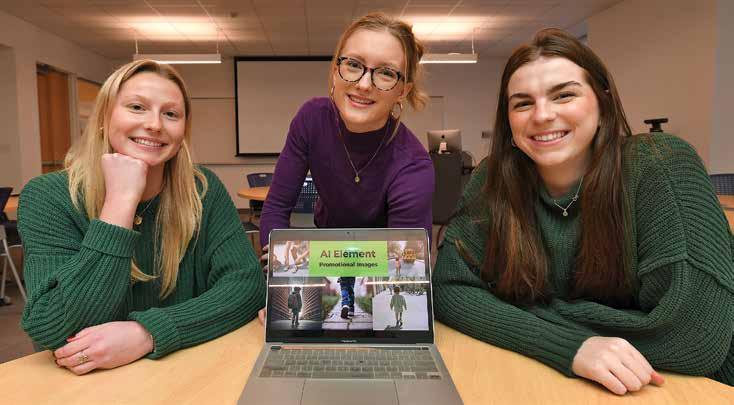
Seniors Katalyn Foster, Amelia Butler and Annah Shaheen participated as a team in the Fall 2023 Digital Marketing Competition hosted by Purdue University. They conceived, developed and recorded an eight-minute marketing campaign pitch deck for a child safety device concept during the “Digital
Marketing” course that I teach. The course requires students to use AI in some capacity.
Out of the 271 teams from around the globe (including seven from Wheaton), they were named a finalist and turned around a more in-depth pitch during the final weeks of the fall
members that helps craft policy for the college—has been in conversation with President Michaele Whelan about the development of institution wide guidelines and standards, Stenger says.
“It really is like standing on the beach and you’re seeing this giant wave that’s coming,” says Professor of English Lisa Lebduska, a widely acknowledged campus leader on AI issues. At the same time,
semester. They placed third in the competition (another Wheaton team finished 19th). Also, Shaheen earned the H. Daubek Award, which is given to the individual student who stood out against all others.
I’m so proud of what these young women accomplished. Wheaton has continually done well against
she stresses that most people are already using AI even if they aren’t describing it that way—think of autocorrect on a text message, or Gmail suggesting how to complete a sentence.
“It’s there. It’s not going away,” Lebduska says. “And so for me the idea is, OK, how do we make this into something good? What can I show my students, what questions can I encourage them to ask?”
larger schools with bigger marketing and business programs every semester. To have teams finish third and 19th this year was an amazing accomplishment.
—C.C. Chapman, senior professor of the practice of business and management
As director of college writing, Lebduska has been tackling one of the biggest conundrums related to AI: the search for constructive ways of using chatbots that still ensure students develop their own writing skills. She thinks ChatGPT could be particularly useful for students who need help organizing their thoughts—often a pain point for novice writers—because it can create outlines
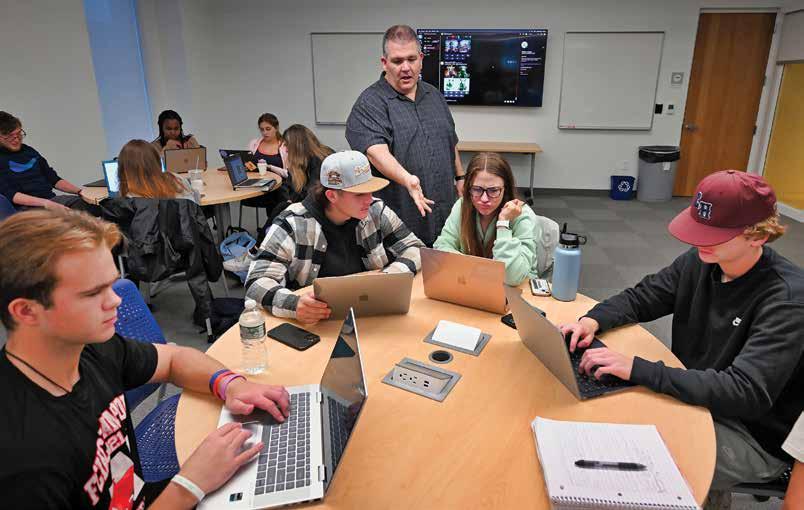
that jump-start them on assignments.
The challenge, said Lebduska, is that “faculty members must assess where students are in their development and to what extent struggling helps students to develop both their organizational skills and resilience and to what extent students are at risk of shutting down. Fast and easy isn't always the goal, nor is endless toil.”
Some students say they are turning to AI regularly to complete assignments, though others say it hasn’t become part of their routine yet.
Butler, a business and management major, says one way ChatGPT has helped her academically is in breaking down advanced texts assigned by her professors. She will sometimes plug a complex reading into the chatbot and have it generate a summary in plainer language to ensure she has understood the crux of the text.
“I use it for everything I can,” Butler says of ChatGPT.
By contrast, Joshua Nangle ’25 says his professors have mostly discouraged students from using ChatGPT—and he himself shares their skepticism.
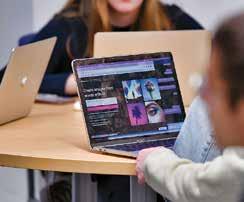
“Honestly, I’ve never downloaded it,” says Nangle, a political science major, with a laugh. “I’m just too paranoid about what that would entail.”
For many, the lightbulb moment regarding AI’s transformative potential came when ChatGPT was released publicly in November 2022. But for Associate Professor of Filmmaking Patrick Johnson, the moment had come about six months earlier.
Johnson was on sabbatical researching how to teach students the skills needed to master the type of 3D virtual production software used to make Disney’s “The Mandalorian.” So, he decided to get access
to DALL-E 2, a cousin of ChatGPT that creates images from text prompts.
“It immediately hit me that many of the skills and things that I was doing in 3D software were getting sort of swept aside and made totally irrelevant by this,” Johnson says.
After that, he began incorporating AI into his “Production I” course, which is offered each semester. One assignment in the course asks students to create an original short film, and in the past they had sometimes struggled to come up with story ideas.
Now, Johnson asks them to go to ChatGPT and input the prompt, “Give me 10 ideas for a short film that involves two actors on a college campus.” They follow up by asking the program to flesh out their favorite of the 10 ideas, then take ChatGPT’s basic outline and use it to write their own script.
“For those who struggle with creative ideation, it just offloads a lot of that stress,” Johnson says.
Samar El-Taha ’25, who took “Production I” last spring, says Johnson was the first of her professors to put
Here is a collection of some of the AI programs used in Wheaton classes as well as by our magazine designer in researching for this story. Most are free to use, some may require a subscription.
ChatGPT chat.openai.com
ChatGPT (Chat Generative Pre-trained Transformer) is designed to understand and generate human-like text based on the input it receives. The model can assist with a wide range of queries, from answering questions to engaging in conversations on various topics.
DALL-E openai.com/dall-e-3
DALL-E can create diverse and imaginative images based on textual prompts, demonstrating the model’s ability to understand and generate visual content.
Midjourney midjourney.com
Midjourney generates images from simple written prompts.
Adobe Firefly firefly.adobe.com
Adobe Firefly, a product of Adobe Creative Cloud, is a generative AI web application often used in the field of design to create images, text effects, color palettes and more.
Microsoft Bing bing.com
Microsoft Bing offers a variety of ways to use AI for text, images and summarizing search results.
Google Bard bard.google.com
Bard is Google’s conversational AI tool to brainstorm ideas, spark creativity and accelerate productivity.
forward AI “as a tool instead of a threat,” and she found ChatGPT’s script ideas provided a way of “getting your creative juices flowing.”
“I think in general Wheaton is a school that’s pretty open-minded about everything,” El-Taha says. “So it doesn’t surprise me that they’re not immediately quick to demonize AI or ban it outright.”
Yet, Johnson himself experienced the limits of AI technology last summer when he tried to create a new work using as much generative AI material as possible. He ultimately found the project unfulfilling as an artist, and was left wondering, “What is the way in which this technology can be used that still maintains that love of the craft, love of the medium?”
Professor of Computer Science Mark LeBlanc—who has been studying AI since he was a graduate student in the 1990s—is impressed by the advances that ChatGPT, Google Bard and similar systems have made. But he is also keenly aware of their limits.
In his new First-Year Experience
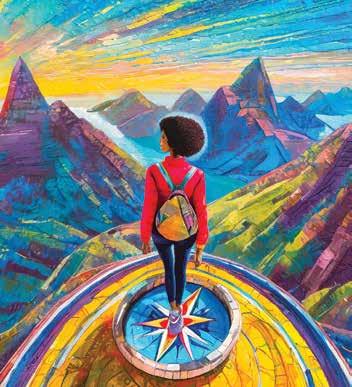
There’s an AI for that theresanaiforthat.com
According to their website they have a database of more than 11,000 AI tools available for over 16,000 tasks.
Professor of Computer Science Mark LeBlanc, who has been studying AI since he was a graduate student in the 1990s, is impressed by the advances that ChatGPT, Google Bard and similar systems have made. But he is also keenly aware of their limits.
course “AI, Big Data and You,” LeBlanc emphasizes that they are all probabilistic models, simply guessing what word to spit out next based on the millions of existing books, articles, websites and other material they’ve been trained on.
LeBlanc offers an example he uses in class: if you ask a generative AI program to finish the phrase “cat in the,” the program will almost certainly suggest “hat”—even though “tree” or “box” could work, too. However, those two words have followed much less frequently in the bot's training.
“The bots generate responses based primarily on the examples that were used when the bot's large language model was trained,” says LeBlanc, who in November 2023 presented ChatGPT workshops at the Boyden Library in Foxborough, Mass., and Norton Public Library.
In his “Foundations of Computing Theory” course, LeBlanc instructs students to use ChatGPT to generate an algorithm, then asks them to verify and annotate the accuracy of the coding. He wants them to see that AI systems can make mistakes, even small ones and that being able to spot those errors is a crucial skill.
“I’m all for ChatGPT getting it almost correct, because it’s making my point exactly,” LeBlanc says. He likes to quote the late Fred Kollett, who was founding director of Wheaton’s Academic Computing Center: “In computing, if you are almost correct you are a liability.”
“What we’re trying to do,” LeBlanc says, “is show them that, at least for now, you’re better than the bot.”
Gabe Amo ’10 won the Nov. 7, 2023, general election to represent Rhode Island’s First Congressional District. The victory makes him the first person of color from the state to hold federal office, according to media stories.
At his election night watch party held at The Guild brewery in Pawtucket, R.I., the city in which he grew up, Amo stood smiling in the soft glow of amber lights and addressed a crowd of excited supporters shortly after the polls closed and it was clear that he had won.
“Happy Tuesday everybody! I am honored for the first time to say that I am your congressman elect!” said Amo, sending the room into wild applause and chants of “Gabe. Gabe. Gabe.”
“I know that you may not know sometimes why I do this, but this room is why. I went to vote with my mom earlier today, and when I was 8 years old, helping my mother study for the citizenship test, I never could have imagined that I would go with her to cast her ballot to vote for her son for the United States Congress,” said Amo, whose parents are Ghanaian and Liberian emigrants.
Amo, who majored in political science at Wheaton, won 64.6% of the vote as the Democratic nominee. He will fill out the remainder of the term of former Rep. David Cicilline, who stepped down to become the president of the Rhode Island Foundation.
The national news media took note of Amo’s win, including NBC News, The New York Times and The Boston Globe. Ted Nesi ’07, the politics editor at WPRI-TV in Providence and a Wheaton visiting professor, also covered the event live throughout election night.
Before the election, through a recorded

message, former President Barack Obama had encouraged voters to get to the polls to vote for the candidate. Obama also called and congratulate him.
Among his evolving leadership roles in Washington, D.C., Amo worked at the White House’s Office of Political Affairs and the Obama-Biden campaign. Most recently he served as the liaison between President Joe Biden and state and local elected officials across the United States.
During his speech, Amo thanked those who have contributed to his success and spoke about what drives him.
“I’ve dedicated the bulk of my career to public service because I believe in the politics of the possible. I believe that when we come together, guided by a common desire to make tomorrow better than today, we can do great things,” he said. “So, as I close this evening, I want to let you know that this is just the beginning of a partnership
between me, between you and the people throughout our communities, the people of the First Congressional District who gave me this great honor tonight. And I dedicate myself to building our community so that everybody can thrive.”
While a student at Wheaton, Amo engaged in his passion for serving in leadership roles. He was president of Wheaton’s chapter of The Roosevelt Institute and served on the Student Government Association and the College Hearing Board. He received a Truman Scholarship for public service and, after graduating, was awarded a Marshall Scholarship to study public policy at Oxford.
In an interview days after the election, we asked Amo about his Wheaton experience and education and how they have supported his success.
“The thing about Wheaton that was great is I got to think broadly about issues
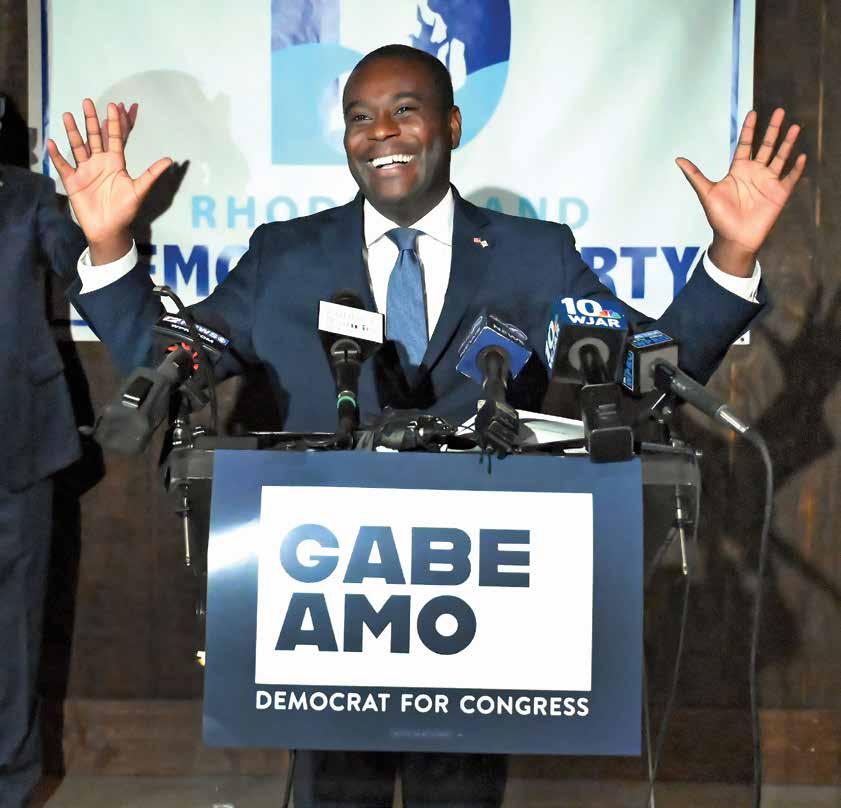
in the world and cover them in different subject areas,” he said.
Beyond political science classes, Amo took courses in philosophy, ethics, English literature and public speaking that provided a range of interdisciplinary knowledge and skill sets used every day.
“Being able to write well is something that comes up over and over. I mean, it’s one of the things that I am most discerning about in my interactions with people because voice [both spoken and written] is critically important when you are relaying big ideas.”
Amo also noted that his extracurricular experiences allowed him to experiment with forms and models of leadership that he ultimately hopes to engage after he’s sworn in as a congressman.
—Sandy ColemanIt might seem unusual, at first, for a Wheaton philosophy major to endow a scholarship and an internship to support environmental science. But for Trustee Emerita Debra “Deby” Glidden ’68, it was a natural choice.
“The environment has been important to me for my whole life,” she said. “I connected with biology professor Scott Shumway at an alumni event in Atlanta several years ago. … We’ve stayed in touch, and we recently had a great conversation about [former chemistry professor] Myrna Pearson, who was his mentor when he began teaching at Wheaton. He described her work with students on the water in the Norton Reservoir. It clicked with me.”
Pearson’s research examined the intersection of chemistry and environmentalism, and she helped to pave the way for Wheaton to develop a major and minor in environmental science.
“Wheaton’s environmental science major connects with my passion for the natural world, wilderness,” said Glidden. “My brother Jeff and his wife Janet joined me in making this gift from our family’s foundation.”
The gift from the Lorraine & Lloyd Glidden Foundation has established the Myrna Pearson Endowed Scholarship Fund for Environmental Science and the Myrna Pearson Endowed Internship for Student/Faculty Research in Environmental Science.
In Glidden’s home state of Georgia, she pursues her interest in nature and gives back through her involvement in the Little Cumberland Island homeowners association, whose members are stewards for the native wildlife and plants on the 2,200-acre island.
The island has a lighthouse that was constructed in 1838. The white acrylic coating used to reface its surface has become discolored. Residents are working with the manufacturer to determine the cause.
“The lighthouse has been an
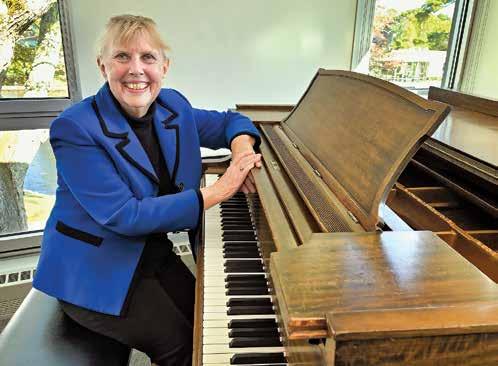
environmental science project for me for almost 25 years,” Glidden said. “No other lighthouse that has used this coating has had this problem. What’s different about our situation? It’s all about the environment—chemistry, biology, geoscience, wind patterns through the dunes.”
Questioning things harkens back to her major in philosophy, which Glidden noted, “has given me an incredible ability to think outside the box and to think logically.”
Since earning her M.B.A. from Boston University’s Questrom School of Business, she has had a successful career in finance. She has been a turnaround consultant for the past 25 years, bringing to bear all her business experience to solve problems for organizations seeking course-correction and stability.
Glidden recognized early in her life that she learned best by doing.
“When I was 6 years old, I asked my parents for a piano because my fingers ached to play,” she said. “They had no money, but they found a local church
that was giving away a piano. I took piano lessons from grade three to 12. That’s the extent of my formal musical training.”
At Wheaton in her first year, a classmate heard her playing piano in one of the practice rooms in the Watson Fine Arts Center. She asked Glidden if she would like to be the pianist for a musical they were staging.
“I said, ‘Sure,’ having no idea that there would be rehearsals five nights a week. But it solidified a connection with Wheaton. That’s part of the reason why I fund music.”
Her love of music led her to establish the Mary Elizabeth Robinson Murphy Endowed Scholarship for music majors, which is named in honor of her grandmother, as well as a fund for musical theater.
In terms of her philanthropy, Glidden says it’s important to know what you are passionate about and then connect it to what is happening at Wheaton now.
“For me, it’s music and the environment.”
—William WalshThe United States Department of Energy honored former Wheaton women’s soccer player Erin Davis ’08 with a 2023 Clean Energy Education and Empowerment (C3E) Award. She was one of 11 women recognized for outstanding leadership and accomplishments in clean energy.
Davis received the Finance Award on Sept. 28, 2023, at the Samberg Conference Center at Massachusetts Institute of Technology. She and the other awardees are described as changemakers having an impact across clean energy fields: furthering equitable and affordable access, expanding markets, leading groundbreaking scientific research, and training and inspiring the clean energy workforce.
The C3E Initiative aims to close the gender gap and increase the participation, leadership and success of women in clean energy fields. In its 12th year, the C3E Initiative is led by the Department of Energy in collaboration with the MIT Energy Initiative, Stanford University’s Precourt Institute for Energy and the Texas A&M Energy Institute.
Davis is the co-founder and chief operating officer of Enduring Planet, a financial technology platform focused on non-dilutive, founder-friendly capital for climate entrepreneurs. In less than two years, Enduring Planet has invested in more than 25 clean energy and climate change projects across the United States, according to a media release announcing the awards.
Prior to Enduring Planet, Davis cofounded and served as the vice president of Social Investment Managers and Advisors, establishing multiple funds worth $180 million to support off-grid energy and financial access.
“DOE is proud to recognize this year’s C3E awardees, a group of innovators and trailblazers bringing unique perspectives and game-changing ideas to the fight for an equitable clean energy future,” said U.S. Secretary of Energy Jennifer Granholm. “Whether leading global research into groundbreaking new discoveries or
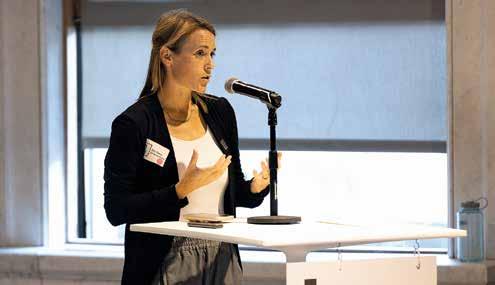
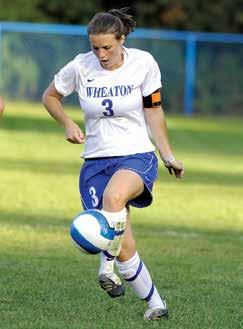
championing environmental justice, these inspirational women are expanding our understanding of the clean energy transition and driving transformative breakthroughs across America’s economy.”
In introducing Davis during the award ceremony, Debora Frodl, founder and chief executive officer at DF Strategies, described Davis as a passionate and authentic leader who is committed to diversity, equity and inclusion.
“I’m delighted to be here to introduce a
remarkable woman. … Erin is a tremendous global leader who has blazed trails in the clean energy and climate investing space,” Frodl said.
Davis, who couldn’t be at the ceremony in person, accepted the award via Zoom.
“I’m so excited to be a part of this amazing C3E community of women, who are driving progress in the clean energy field,” she said. “I’m deeply grateful for this platform and the opportunity to share my story and work.”
As a student-athlete at Wheaton, Davis enjoyed an outstanding four-year career with the women’s soccer team, helping the Lyons to four consecutive NCAA Tournament appearances, including the Final Four in 2004. She was a two-time National Soccer Coaches Association of America All-America selection and the New England Women’s and Men’s Athletic Conference Player of the Year.
In addition, Davis, who majored in Hispanic studies, was a part of one of the most successful four-year stretches in NCAA history, contributing to an 84–9–6 record during her time at Wheaton.
—Athletics staff
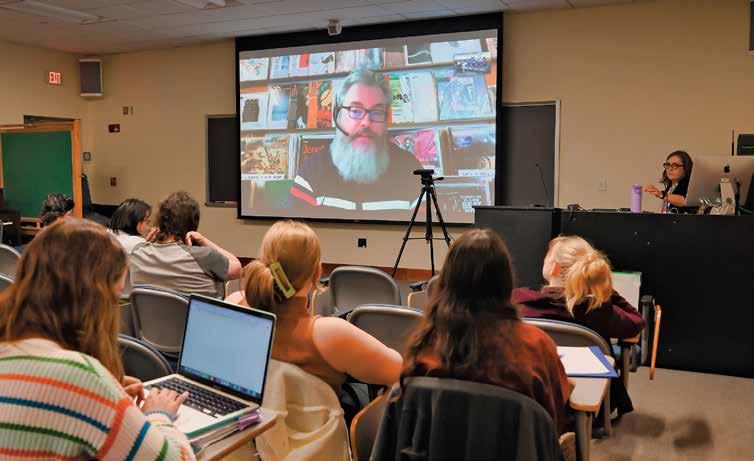
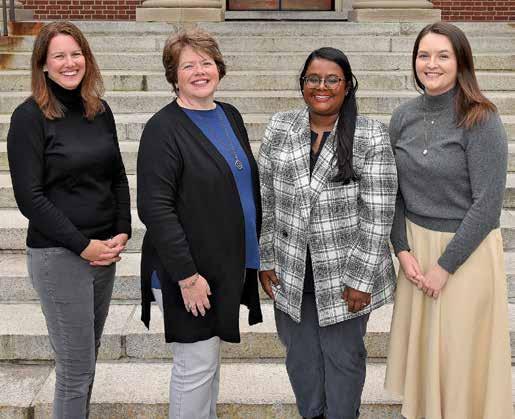

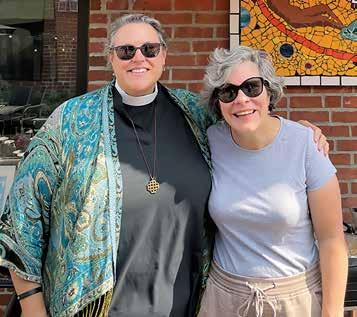
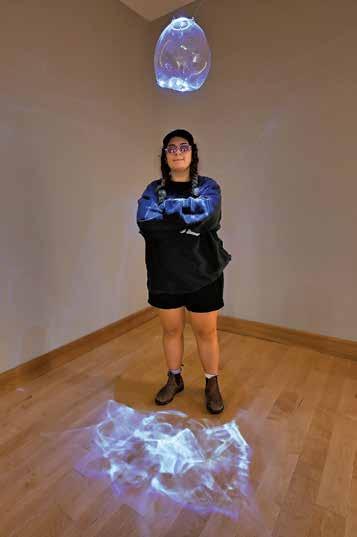
Did your contact information change?
Report changes of address and email to Alumni Relations at 508-286-8207 or alum@wheatoncollege.edu.
Is your class year missing and you have news to share?
Contact us at classnotes@ wheatoncollege.edu and we will put you in touch with your class secretary.
Looking to volunteer?
Contact our Alumni Relations Office to get involved at 508-286-8207.
For class secretaries: How to submit your Class Notes
By email: Submit Class Notes to classnotes@wheatoncollege.edu. Include your class year in the subject line (e.g., “Class Notes, 2001.”)
Deadlines
Spring: Jan. 17, 2024
Fall: June 6, 2024
Winter: Sept. 26, 2024
Photos
To submit digital photos, email them as an attachment to classnotes@wheatoncollege.edu. For full guidelines, visit wheatoncollege.edu/ wheaton-magazine/submitting-digital-images.
For all photos: Please supply a brief description of the event and all the names and class years of the alumni in the picture.
Please note: The photos you send in must be sharp and clear. Photos that are out of focus, or that have harsh shadows, over-exposed areas or “red-eyed” subjects may not be usable. Often we receive more photos than we can use in any one issue. When this happens, we will select photos that represent a variety of class years and timely events.
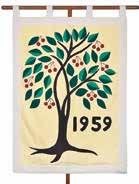
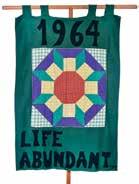
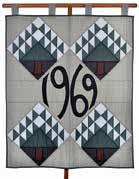

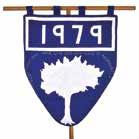
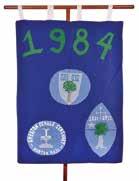
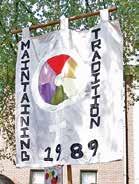
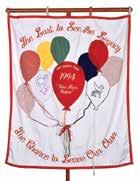
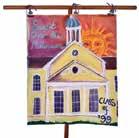
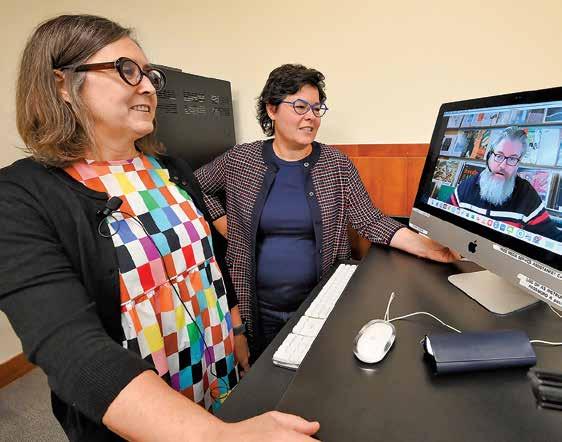
Michele L’Heureux ’88 and Boon Sheridan ’94, user experience (UX) designers, spend their days thinking about how audiences interact with websites and creating ways to make those encounters easy to navigate.
On Sept. 26, 2023, they visited campus in person and virtually for World Interaction Design Day, an annual global event that celebrates the benefits of interaction design and the connections made. The two alums shared their current design work with students in Ellison Lecture Hall, at the invitation of Professor of the Practice of Design Tania Schlatter.
Sheridan, who majored in English literature at Wheaton, is a UX researcher and designer for 18F, which partners with federal, state and local agencies to improve the experience of users accessing government services.
L’Heureux, who majored in studio art, is a staff product designer at Chewy, which specializes in pet supplies. With more than 10 years of experience in the UX field, she said that her Wheaton education has contributed to her ongoing success.
“I was able to study a lot of different things at Wheaton, from painting and printmaking to Russian, ethics and creative writing. I was also an activist and an athlete, which provided additional avenues for learning and growth,” L’Heureux said. “Wheaton was a terrific laboratory for my curiosity and experimentation, and it fostered in me a sense of confidence in my ability to solve problems, to take things apart and put them back together in new ways. These qualities and skills have served me well in seeking out career pathways, educa-
tional opportunities and ways of engaging with the world that align with my interests and values.”
During the presentation to students, L’Heureux and Sherida n offered very helpful information, said Schlatter, who asked her students from her fall class, “Design Methodologies and Designing Interactions,” to attend the talk.
“Michele’s examples of everyday work and descriptions of decisions she is responsible for helps students picture some aspects of software-based design work. She mentioned design systems and how systems define some aspects of a design while relying on criteria that has already been established, such as button style and behavior. This speeds up work and enables consistent products,” Schlatter said.
“Boon’s comments early in his talk about how titles for design work shift and that software used shifts highlights that key design skills are foundational,” Schlatter added.
“It was also great to have two alumni who are seasoned practitioners but who work in such different areas. … It’s nice to have that contrast to help illustrate part of the range of what’s possible for professional design work now,” she said.
Annie d'Arbeloff ’24, an independent major in creative marketing, enjoyed attending the presentation. “I learned about a part of design that I didn't realize was so important and it made me understand the process of design more,” she said. “It helped me understand design methodologies more and real-world tasks that designers are given.”
—Sandy ColemanPsychology major Tony Laing ’96 Wheaton Fund Internship recipient
“I spent last summer learning how to work with groups in a therapeutic setting during my internship at Riverside Community Care in Somerville, Mass. I have been considering mental health counseling as a possible career, so I thought this experience would be helpful. I enjoyed working with youths and gained a better understanding of the field. I am so grateful for this opportunity and look forward to more.”
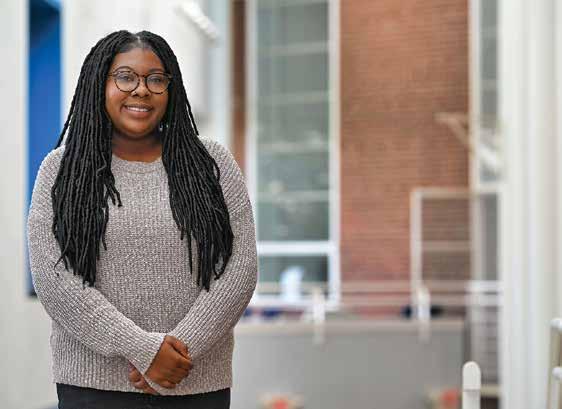
Give to the Wheaton Fund today to support the dreams of tomorrow.
Go online to learn more about how your support creates opportunities for T’nysha and other students.
wheatoncollege.edu/giving
Growing up the son of a professional musician, Nick Fradiani ’08 was introduced to the music of Neil Diamond as a young child when his parents took him to his first-ever concert to see the singer in Connecticut. Now, Fradiani is playing Neil Diamond on Broadway.
Fradiani stars as Neil Diamond—Then in the musical “A Beautiful Noise,” which chronicles the legendary singer’s life and features his hits “Sweet Caroline,” “America,” “Cracklin’ Rosie” and others.
Fradiani, who majored in U.S. history at Wheaton College and is the 2015 “American Idol” winner, began playing the singer at the Broadhurst Theatre in New York City on Oct. 31, 2023. He has been a part of the show since it opened in December 2022 as an
alternate for the role.
Many recent media outlets have featured stories about Fradiani’s journey, including People Magazine, NBC’s “New York Live” and Broadway Buzz, to name just a few.
When asked by “New York Live” host Sara Gore whether performing on Broadway was on his bucket list, Fradiani said that it was not and talked about how he had never performed in musical theater until his role in “A Bronx Tale” in 2019.
“It’s just crazy how it all fell into place and I love it. It’s a lot different than what I normally do. But, I just love the acting side of it. I put a lot of work into that. And I feel good about what I’m doing,” Fradiani said.
—Sandy Coleman
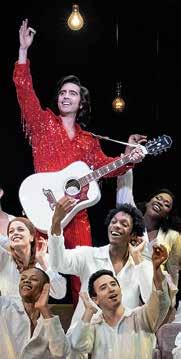
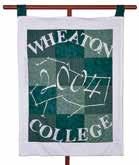
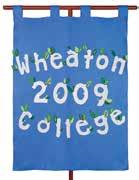
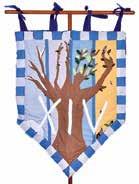
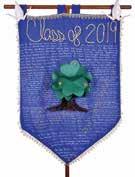
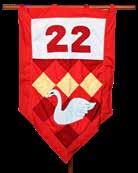
Amy Whitcomb
Slemmer ’86 thanks classmates for support after cancer diagnosis
About a year ago, I was biking from my Boston office in a rush to make the commuter boat when I felt a sharp twinge on my left side.
I did not give my back another thought until a few days later when the discomfort returned. In August 2023, when I finally went to get things checked out, the first set of tests were scheduled in pursuit of a possible kidney stone. The results of each test became increasingly scary. So for the second round of confirmatory imaging, I went to see my dear classmate Angela Heffernan Toussaint and told her
what was happening.
My favorite part of letting her into the process was her declaration that “ummmmm, we didn’t sign up for this!,” which made us howl with laughter and became a mantra as the crummy news accumulated. Angela was with me when the high contrast imaging confirmed a mass and the first time the diagnosis of ovarian cancer was uttered. I sobbed audibly, and she held my hand.
I scheduled surgery and began to share the diagnosis with people at work, at church, and in my life. I’m blessed to have a family that sprang into action and supported me through my surgery, chemo, and follow-up.
Angela reached out to other classmates, who created the most incredibly supportive text chain. They made a playlist to
cheer me up called “Amy’s Girl, You Got This”—with tons of music from our college dancing days.
I received cards and wellwishes from classmates I hadn’t heard from since graduation. Every time I opened and read the kindness in each envelope I was grateful and felt connected to my classmates, many of whom had also struggled with health issues, or were grieving the loss of spouses, parents or children.
Beth Fitzgibbons Fleming met me for Thai food and dazzled me by ordering in Thai, reminding me about her time in the Peace Corps. I don’t know how the fundraising was done, but Beth also gave me a Dana-Farber Care Card to use for acupuncture and massages to enhance my healing and minimize my symptoms
during five months of chemo.
My surgery last September was successful and the likelihood of me having a long and full life are good.
Now, when people tell me they don’t know what to do about a friend who has a scary health diagnosis, I tell them the story of the Class of ’86. You can’t cure the diagnosis, but you can make the journey lighter.
There is a special bond between our class members. A bunch of us (I was!) were pretty angry with the coed decision, and our connection has transcended that. As an Episcopal priest (and a lawyer), I often include you in my prayers and these days I am connected to you with prayers of gratitude. To know that there is a connection with women in the world doing
Lindsay Powell ’13, who majored in sociology at Wheaton, was sworn in as the newest member of the Pennsylvania State House in October 2023, after winning a key race in a special election to replace three-term representative Sara Innamorato.
Several media outlets featured stories about her victory, including The Associated Press, Pittsburgh Post-Gazette, the Pennsylvania Capital-Star news website and the New Pittsburgh Courier.
The Courier’s Sept. 29 story “Lindsay Powell dominates special election, will serve as District 21 representative” noted that she made history.
“Lindsay Powell, 32, a New York City native who has made Pittsburgh her home for the past 10 years, made history as the first Black woman to represent House District 21, handily winning a special election on Sept. 19,” Rob Taylor Jr. wrote.
In the story, Powell shared her inspiration for seeking the seat.
“I’ve always been very pas-
sionate about doing good work for our community,” she told Taylor. “When the opportunity arose where I could pair my lived experience with my passion for doing good work and my background in policymaking, I was really excited about the opportunity to serve my community in this way.”
Powell has been a rising star for many years. In 2019, Pittsburgh magazine named her one of the city’s “40 under 40” for work promoting racial, gender, development and housing equity as the assistant chief of staff within the office of the mayor.
At Wheaton, the Posse Scholar was president of the Student Government Association her senior year and a Fulbright Scholar. She earned a master’s degree in public policy management from Carnegie Mellon University’s Heinz College in 2017.
—Sandy Coleman
amazing or unheralded things, I feel privileged to be among you and grateful for your heartwarming efforts.
Thank you Class of ’86, especially Angela Heffernan Toussaint, Allison Thornton Newman, Jennifer Richards, Pamela Goddard, Julia Grammar, Beth “Betty” Fitzgibbons Fleming and Kris Kornmeier ’74, who has blazed the long-term survivor’s path and has stuck with me through thick and thin.
With love—the Rev. Amy Whitcomb Slemmer ’86
The Rev. Amy Whitcomb Slemmer is the former chief compliance officer and executive vice president for government relations and community engagement at the Fenway Community Health Center.

Bláithín Haddad ’19, a Wheaton visiting assistant professor of art, was one of two creatives to kick off Wheaton’s inaugural artists in residence program in the Beard and Weil Galleries during the fall semester.
From August 30 through Oct. 14, 2023, Haddad spent time working on printmaking, papermaking and a sculptural installation that featured light and hand-blown glass. The artist also led a workshop and talked with senior visual art and design majors who visited the galleries.
In 2022 Haddad, who majored in visual art at Wheaton, received an M.F.A. in printmaking and a certificate in collegiate teaching in art and design from Rhode Island School of Design in Providence. Her work has been exhibited at the Root Division Gallery in San Francisco and the Sol Koffler Gallery, Gelman Gallery and Dye House in Providence.
“I am constantly longing to feel that I belong to the cultures that my parents and grandparents represent, and as time goes on, I am fearful that I will be less a part of the two cultures that make me the person I am,” the daughter of two immigrants wrote about her work. “‘Third culture’ individuals seem to be straddling two or more cultures, occupying multiple valences simultaneously and none at the same time. In making paper and giving the fiber another form, I hope to represent the opportunities they gave me to create anew. I want to demonstrate a mindfulness toward the significance of the material, layering and the context of the work. Paper and glass transform through alchemy, changing into something completely different. Paper, much like glass, transforms while holding memory.”
Adjua Gargi Nzinga Greaves, a multi-disciplinary artist and
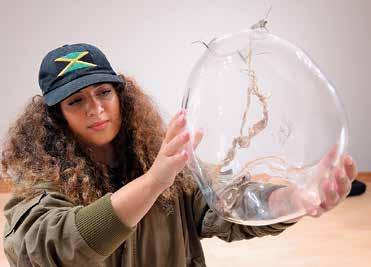
writer from New York, held the other artist in residence and was often in galleries with Haddad.
“The six-week opportunity is designed for artists to develop new work, visit with classes, hold open studio hours to discuss their practices with students, engage in collaboration and offer a public workshop open to the Wheaton and surrounding community,” said Elizabeth Hoy,
the galleries director.
The residencies were funded by the Evelyn Danzig Haas ’39 Visiting Artists Program. Hoy is hoping this initiative will become a biannual program.
“It supports the artistic development of professional artists while advancing creative and artistic excellence within the Wheaton community,” she said.
—Sandy Coleman
Helen Parr May, 95, passed away peacefully on Nov. 22, 2023. She graduated from Wheaton with a major in chemistry. After a few years of working in pharmacological research for Lederle Laboratories in Pearl River, N.Y., she undertook a project for E.R. Squibb and Co. at the Reading Hospital in Pennsylvania. There, she was introduced to Joel May by his mother, and they subsequently married in 1959. An avid golfer all her life, she was a longtime member of the Hopewell Valley Golf Club. She also bowled in a league, where she was the longtime treasurer. Her civic involvement included work with the New Jersey Special Olympics, United Cerebral Palsy and American Red Cross blood drives.
Nancy Lamson Tousey, 95, died Oct. 18, 2023 in Wells, Maine. She attended Wheaton and majored in psychology.
Fran Vinton Smith, 95, died July 28, 2023. She graduated from Wheaton with a major in chemistry and served on the Alumni Board of Directors.
Betty “Dink” Wise Oliver, 93, passed away peacefully on Nov. 13, 2023, in Westerville, Ohio. She graduated from Wheaton with a bachelor’s degree in government. In 1958, she married Wallace Oliver, whom she had met while they were both working for Owens Corning Fiberglass in New York City. Betty enjoyed volunteering and was very involved at her children’s schools while the family lived in Pittsburgh. She shared her compassion and care for others as a volunteer at Roper Hospital in Charleston, S.C. After settling in Westerville, she enjoyed singing in the church choir and playing bridge with friends. Most of all, Betty cared deeply for her family and loved the time spent with them.
Nancy Renison Cooper, 92, passed away Sept. 30, 2023. She graduated from Wheaton with a bachelor’s degree in psychology.
Patricia “Pat” Butterfield McLeod, 93, died peacefully at home in Brewster, Mass., on Nov. 6, 2023. Pat met her future husband, Chester McLeod, at Whitman High School. She graduated from Wheaton with a major in psychology and went on to teach kindergarten and first grade. Pat and her husband raised
On Oct. 22, 2023, the family and friends of Jeanne Whitaker, a longtime member of the Wheaton French Studies Department, gathered in the Quaker cemetery in Prospect Park in Brooklyn, N.Y., for the interment of her ashes and to share readings and personal memories.
Jeanne, a professor emerita of French, passed away in October 2021 at the age of 95.
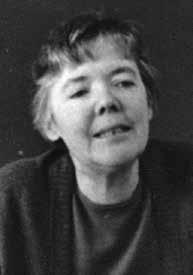
She earned her bachelor's degree at Swarthmore College. After graduating in 1946, she attended Bryn Mawr College, where she taught French and later earned her Ph.D. in linguistics and literature for her thesis on “Poetic Movement in Les Fleurs du Mal.”
She was hired at Wheaton in 1965, earned tenure in 1969 and was promoted to full professor in 1988. She retired in 1999.
Jeanne was a well-loved member of the French Studies Department. She was always willing to give extra help to any students who needed it, while maintaining high standards and quietly imparting her great love of French literature, especially poetry, to generations of Wheaton students.
During her time at Wheaton, she served on many committees, including as co-chair of the Faculty Fundraising for Future Developments Program Committee (1979–80) and as a member of the Tenure Committee (1984–87). She also was a faculty representative to the Student Government Association (1967–70) and chair of the Wheaton chapter of United Campuses to Prevent Nuclear War (1982–88).
Jeanne often told of how she had become a feminist while at Wheaton, where she loved encouraging female students and colleagues. In 1985, she was excited to serve as a delegate to the Third United Nations World Conference on Women in Nairobi.
Beyond teaching, she loved to cook a variety of foods and was an avid consumer of the news, books and periodicals.
She was an active member of the Friends Meeting in nearby Providence, R.I., where she helped set up a branch of the American Friends Service Committee.
After retiring, Jeanne lived in Providence until 2011 when she moved to an independent-living community in Kennett Square, Pa., to be in a community of Quakers.
their family in Randolph, Mass., where she taught for more than 30 years, before eventually retiring in Brewster.
Ann Rowland Howard, 91, died Dec. 7, 2022. She graduated from Wheaton with a major in American civilization.
Jayne Goodman Cohan, 90, died peacefully at her home in Palm Beach Gardens, Fla., on Dec. 4, 2023. She was married to Herbert Cohan for more than 50 years until his death in 2018. She attended Wheaton, where she excelled in science and math before graduating from Boston University in 1954.
She was an active participant in the civic life of the Worcester, Mass., community, volunteering as a docent for many years at the Worcester Art Museum while raising her children.
Viola “Vi” Ryder Nicholson, 89, passed away Nov. 28, 2023. She graduated from Wheaton with a degree in psychology and earned a master's degree in theater arts at Smith College. Vi married the late P.C. Nicholson, in 1968, and lived the rest of her life in their new home in Littleton, Mass. Vi worked for the Arapahoe County Clerk and Recorder Office, writing marriage licenses and searching and recording public records for 22 years. She enjoyed hiking and traveling with friends and family. She also sang in the choir and acted in plays at Littleton United Methodist Church for many years.
1956
Lynn Kelley Bernstein, 86, passed away peacefully at home on April 12, 2021. Lynn was the greatly beloved wife of Peter Bernstein and a woman of deep and unshakeable Christian faith. Lynn’s quiet strength and grace touched many people. Her example of selfless love and courage inspired all who knew her well.
Marla Orr MacKenzie, 88, died peacefully Nov. 12, 2023, at her home. Marla graduated from Wheaton with a major in psychology. In addition to working full time and raising two children, Marla also made time for a variety of volunteer positions. She was most proud of serving as an alumna trustee for Wheaton. In her limited spare time, she loved to hike, read and do The New York Times crossword puzzle. Spending time with close friends was also a priority. She was a loving and supportive friend.
Elizabeth Adams Moulton, 86, passed away Sept. 15, 2023. She graduated from Wheaton with a bachelor’s degree in musicology. She met husband Lester Moulton at a Harvard-Wheaton mixer. They married in 1957 and moved to Marblehead, Mass., where their three daughters were born. In 1973, the family settled in Newport Beach, Calif., and Elizabeth joined what is now known as the Pacific Chorale. She had a thriving catering business and taught cooking classes throughout Southern California. She contin-
Jonathan Walsh, professor of French studies and chair of the French Studies Department at Wheaton, died Oct. 10, 2023 at home in Barrington, R.I., following a long illness. He was 61.
Jonathan earned a both bachelor’s degree and master’s degree from the University of Connecticut, Storrs, and his Ph.D. from the University of California, Santa Barbara.
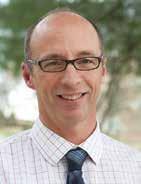
He joined the French Studies Department at Wheaton in 1994. He was awarded tenure in 2000 and promoted to full professor in 2009.
A specialist in French literature of the Enlightenment and the Early Modern period, Jonathan was a teacher who possessed an unwavering love for his craft. His scholarly contributions were extensive and deeply impactful. Much of his work focused on Enlightenment fiction, with his 2001 publication Abbé Prevost's Histoire d'Une Grecque Moderne: Figures of Authority on Trial.
ued learning from cooking masters throughout her life and studied under world-class chefs, such as Julia Child and Jacques Pepin. She also supported her husband’s love of sailing through their involvement in yacht clubs and racing activities. Beyond singing and cooking, her greatest joy came from her family and friends.
Laura “Laurie” Barrett Scherz, 78, died on Aug. 25, 2023. She graduated from Wheaton with a major in sociology.
Adelaide Winfree Simpson, 78, passed away July 19, 2023. She graduated from Wheaton with a major in French. She went on to earn a master’s degree in education in 1971 from Bank Street College in New York. She taught for several years in Connecticut and Washington, D.C., before pursuing a Ph.D. in clinical psychology at Virginia Commonwealth University, which she completed in 1983. Adelaide married her former husband, Lorenzo Simpson, and had a son. She married
He also translated two novels by Madame de Tencin, and authored numerous articles and papers. In his recent work, he delved into the salons of 17th- and 18th-century Europe, with a particular emphasis on the influential role of women in the Enlightenment.
Jonathan’s interests and hobbies included sailing his CAL-33 masthead sloop Hot Tuna out of the Bristol Yacht Club, and playing guitar and singing in the band Ghost Cat Rodeo at venues throughout Rhode Island.
Jonathan’s belief in the inseparability of language and culture formed the cornerstone of his teaching philosophy. He reveled in sharing the richness of French culture and its contributions to the world of art and thought through films, novels and essays.
He believed that by mastering the language, one could gain access to an alternate universe of creativity and intellect.
“Jonathan was a kind and generous
Dennis Winston in 2002. Simpson was a highly respected clinical psychologist, who worked with individuals and families for 36 years–one of the longest serving African American clinical psychologists in private practice in the Richmond area. Fluent in both French and Spanish, she worked as a translator for the U.S. government briefly after college. She also pursued her passion for dance by studying with the Alvin Ailey Dance Co. between 1971 and 1975, and later performed with the Virginia Commonwealth University dance company.
Carol Magovern Canter, 79, died Oct. 7, 2023. She was the beloved wife of Stephen. Carol graduated from Wheaton with a major in English. She was the loving mother of three. Carol’s passions and interests included opera, piano, theater, travel, American art, cooking, swimming and tennis. Above all, she cherished her time with family and close friends. Carol was committed to service and leadership, especially as it pertained to education and the arts. She generously gave her time and talent as a writer in her board
colleague, mentor and friend to the many faculty and staff who were lucky enough to know him and to work with him,” Interim Provost Karen McCormack wrote in sharing the news with the college community.
“Jonathan was an excellent teacher who touched the lives of countless students over the nearly three decades that he shared his gifts with the Wheaton community.”
Professor of English Deyonne Bryant, president of the executive board of the Wheaton chapter of the American Association of University Professors (AAUP), also shared thoughts about Walsh.
“We, the AAUP Executive Board members, wish to remember Jonathan's unwavering commitment to the AAUP, most recently as chapter president during 2018–2019,” Bryant wrote. “Many of us who had the privilege to work alongside Jonathan hold dear memories of his kindness and welcoming nature. We also recall Jonathan's dedication to and advocacy for the principles and standards that empower us as scholars, artists, researchers and teachers at Wheaton.”
service at various institutions, including Wheaton’s Alumni Board of Directors.
Cally Chandler Moore, 77, passed away on May 20, 2022. She attended Wheaton before leaving school to join the newly founded Volunteers in Service to America (now AmeriCorps VISTA) in West Virginia. After her term of service with VISTA, she eventually earned a bachelor's degree in English from University of Maine, Orono, and later a master’s degree in education.
Amy Hyzer, 65, passed away peacefully on Jan. 21, 2023 in Boston after courageously battling a lengthy illness. She attended Wheaton, where she made many lifelong friends. After a long career as an event planner with Medisense and Abbott Laboratories, Amy transitioned to the hospitality business in Boston. Known for her inclusivity of all people, Amy was often seen at the outskirts of gatherings pulling people in toward the center. She was smart, fierce, loyal and supportive,
and loved people, animals, dancing, thrift shopping, reading and all things French, especially restaurants.
Anne Doran, 57, passed away on Aug. 24, 2023. She graduated from Wheaton with a major in economics.
1957 Jay Kaufman, husband of Shirley Salmonsen Roberson Kaufman, in October 2023
1969 Daniel Markstein III, husband of Rosalind Weil Markstein, August 2023
1975 Dorothy Larson, mother of Hope Gallagher Ogletree, February 2023
1977 Patricia Butterfield McLeod ’55, mother of Diane McLeod Delaney, November 2023
1992 Evelyn Kmetz, mother of Kathy Kmetz Devaney, September 2023
1999 Daniel Markstein III, father of Virginia Markstein O'Hara, August 2023
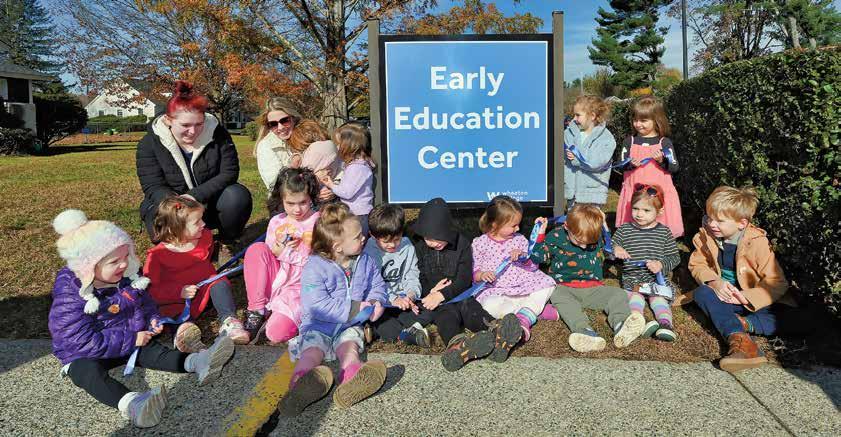
The name of the Elisabeth Amen Nursery School has been changed to the Wheaton College Early Education Center. The name change clarifies the role of the center.
The Early Education Center is a preschool that provides local families a nurturing place for their children to learn and grow while offering an opportunity for Wheaton students to learn in a lab setting as they observe children in a natural school environment. While the name is changing, the programs, hours of operation and staff will remain the same.
Affiliated with the college's psychology and education departments, the Wheaton College Early Education Center has been a site for child development study and research and early childhood education since 1931 and was one of the first college-affiliated laboratory preschools in the country.
“The preschool was established by Elisabeth W. Amen, a pioneering scholar of early education, with the vision of
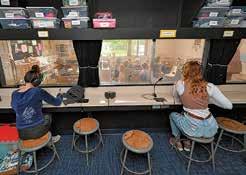
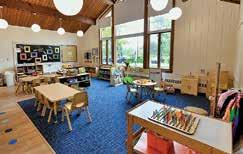
creating a school on campus where psychology students could study and learn from young children. This primary objective remains unchanged to this day, and
the center also offers a variety of college courses that leverage this unique pedagogical setting,” said Michelle Curran-Mason, Early Education Center director.
“As scholars and early childhood educational professionals, we remain committed to providing an environment rich in play, guidance, socialization and learning best practices for the youngest learners to foster their growth,” Curran-Mason said.
President Michaele Whelan noted that the Early Education Center is a rich resource for Wheaton students and faculty and it is one of the many important ways the college continues to be connected to the local communities.
“We are excited to celebrate this milestone in the storied history of this place of early childhood education and lab school learning,” Whelan said. “We also are looking forward to many more years of nurturing future generations of young learners and gaining knowledge from them.”
—Sandy Coleman“I was a first-gen student before the term was coined. My parents were thrilled that Wheaton continued their efforts to make me confident, independent and eager to learn. The Class of 1968 was the first wave of baby boomers, and we were the largest class in Wheaton’s history at the time. We were a particularly talented group of students, who have gone on to great accomplishments. We have demonstrated the value of a liberal arts education, and we continue to learn from one another through our vacations together in Florence, Vienna, Berlin, Washington, D.C., Boston and New York City. I married for the first time five years ago, and my husband, John Higgins, appreciates how supportive my classmates are of one another. I know from my fundraising experience that all students benefit from financial support from Wheaton—even if they do not receive scholarships. Consequently, giving to Wheaton allows us to ‘pay it forward.’ Establishing an endowed scholarship through a bequest enables me to honor my parents and provide current students with the same fine education I enjoyed.”
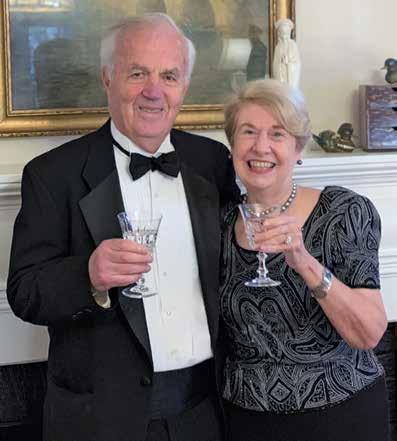
Retired from the National Labor Relations Board as the regional director of the New England office Member of the National Academy of Arbitrators
Wheaton Fund supporter
“I treasure the people I met at Wheaton and the education I earned. I wouldn’t be the man and person I am today without the bonds I’ve forged and maintained with so many influential people in my time at the college. I remain very close to key influencers in my life—faculty, staff and college leaders. They saw greatness and a light in me that I struggled to see at times. The small liberal arts community was instrumental in helping me better understand myself and the world around me. I’m in my final year as a member of the Alumni Board of Directors. Being on the board has provided me with key insights on the importance of the number of donors and donor dollar amounts. Both make a big difference in Wheaton receiving crucial grants that fund important experiential opportunities for current students—internships, research, study abroad programs. An education in the classroom is only as valuable as the experiences that happen outside of the classroom. That’s why I contribute to the Wheaton Fund and encourage all of us to do so.”
Scaled operations specialist at Google LLC Wheaton Alumni Board of Directors member (2021–2024)
